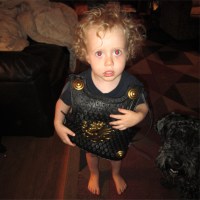|
August 2011 Updates
Make up your mind...

[ The month of Elul marks the beginning of a 40 day "Season of Repentance" in preparation for the High Holidays. This year, the month began on August 29th at sundown. May God show us mercy and help us draw closer to Him... ]
08.31.11 (Elul 1, 5771) "How long will you go limping between two different opinions? If the LORD is God, follow him; but if Baal, then follow him" (1 Kings 18:21). These words of Eliyahu ha-navi (Elijah the prophet) are meant for us to hear today, at the beginning of this Season of Teshuvah. We are being called to make up our minds (metanoia) and turn (shuv) to the LORD. After all, what is more important to you than your relationship with the LORD God of Israel? Is there anything more important than this?
Our Torah reading this week (Shoftim) addresses this very issue: "You must be wholehearted (tamim) with the LORD your God":
תָּמִים תִּהְיֶה עִם יְהוָה אֱלהֶיךָ
ta·mim ti·he·yeh im Adonai E·lo·he·kha

"You shall be wholehearted with the LORD your God"
(Deut. 18:13)
In the Sefer Torah (i.e., the handwritten Torah scroll), the first letter of the word tamim ("wholehearted") is written extra LARGE in order to emphasize the importance of the word. Notice also the little word "with" (עִם) that follows in this verse. This hearkens to Micah 6:8: "What does the LORD require of you but to do justice (mishpat), and to love kindness (chesed), and to walk humbly (hatznea lechet) with your God?" Having a humble heart walks with the LORD. Humility begins with the awareness that 1) there is a God and 2) you are not Him.... It is the practice of "knowing before whom you stand" and living your life in light of this fundamental truth.
The word tamim (תָּמִים) means "finished," "complete," or "thoroughly made." For example, tamim is used to describe completed years (Gen. 47:18); healthy animal sacrifices (Lev. 22:21-22); nourishing vines (Ezek. 15:5); truthful speech (Amos 5:10); finished building projects (1 Kings 6:22); and so on. In our relationship with God, tamim means being "blameless" in the sense of being wholehearted, resolute, and entirely committed to walking "with" Him in this world. Psalm 119 begins, "Happy are those whose way is blameless (tamim), who walk in the instruction of the Lord."
אַשְׁרֵי תְמִימֵי־דָרֶךְ הַהלְכִים בְּתוֹרַת יהוה
ash·rei te·mi·mei da·rekh, ha·ho·le·khim be·to·rat Adonai

"Happy are those whose way is blameless,
who walk in the teaching of the LORD"
(Psalm 119:1)
Here we see that "walking in the instruction (Torah) of the LORD" is the means by which we are able to walk humbly with God. The study and practice of Torah, then, helps us to become tamim: wholehearted, resolute, and committed to God. Walking in God's truth also makes us happy (i.e., me'ushar: מְאֻשָּׁר, from the verb ashar that means to "walk straight"). As we walk in the truth of God, we begin to experience inner peace and a sense of abiding joy...
The Scriptures state that a "double-minded man is unstable in all his ways" (James 1:8). The word translated "double-minded" is dipsuchos (δίψυχος), a word formed from δίς, "twice" and ψυχή, "soul." The word describes the spiritual condition of having "two souls" that both want different things at once. It is therefore a state of inner contradiction, of having two separate minds holding contradictory thoughts. "How long will you go limping between two opinions?" Notice that the word translated "limping" is posechim (פּסְחִים), from the same root as Passover (i.e., pasach: פָּסַח): How long will you pass from one thing to another? How long will you play "hot potato" with your commitments?
Having a double-mind makes us "unstable in all our ways." Such a cross-eyed approach leads to disorientation and confusion. The Greek word used to describe being "unstable" (ἀκατάστατος) is the same word used to translate being "storm-tossed and not comforted" in last week's Haftarah portion (LXX: Isa. 54:11). The image of a ship being tossed in the sea pictures a state of distress and peril. Interestingly, the description of being "not comforted" is lo nuchamah (לא נֻחָמָה), which comes from the very word translated as "repent" or "regret" (nacham). When we are double-minded, we are "storm tossed" and unable to experience the comfort that comes from genuine repentance. We are like "a wave of the sea that is driven and tossed by the wind" (James 1:6).

On the other hand, singleness of vision concentrates the will and produces wholeheartedness, conviction, stability, inner peace (shalom) and genuine character. As Kierkegaard said, "purity of the heart is to will one thing." "I have set the LORD always before me; because He is at my right hand, I shall not be moved" (Psalm 16:8).
Someone might ask, how do we stop being "double-minded"? This is the essence of the problem, isn't it? How do we stop being of "two minds," experiencing that ambivalence of both wanting and not wanting something? In other words, how do we repent - both in the sense of "changing our minds" (metanoia) and in the sense of practically turning to God (teshuvah)? How do we find that purity of heart that wills one thing?
The antidote for having a "double-mind" is explicitly given in the Scriptures: "Draw near to God and He will draw near to you (ἐγγίσατε τῷ θεῷ καὶ ἐγγιεῖ ὑμῖν), cleanse your hands, you sinners, and purify your hearts, you double-minded" (James 4:8). Note that the verb used in this verse ("draw near!") means to come close enough to touch someone or something. Understood in this light, we are encouraged to come so close to God that we are able to "touch" Him -- and to be touched by Him as well. Drawing near to God is God's way of drawing near to you... In other words, as you draw near to God, He will draw near and touch you.
In practical terms, here are some specific things we can do to "draw near to God so that He will draw near to you." First we can simply pray and earnestly cry out to God for help. The LORD is not indifferent to our suffering and has promised to give us the Holy Spirit to help us. But genuine prayer requires honesty and confession (ὁμολογία), which means agreeing with the truth about your condition. This means, among other things, identifying the ways you have withdrawn from your relationship with God. Indeed, the word homologeo (ὁμολογέω) literally means "saying the same thing" - from ὁμός (same) and λόγος (word). There's little use trying to pretend before God or to rationalize your own double-mindedness before Him. God knows the number of hairs on your head; He surely knows the condition of your heart!
Second, we must vigorously challenge ideas that attempt to seduce us away from the truth and thereby divide our affections. We must learn to take "every thought captive" to Messiah and be on guard for subtle appeals to compromise (2 Cor. 10:5). If we find ourselves in a state of recurring temptation, we must examine the underlying assumptions that are at work in our thinking. If we dig deeper, we are likely to discover that we doubt that God cares for us, or we are fearful that God will not meet our needs. We must therefore counter such assumptions with God's revealed truth, and that means regularly studying the Scriptures to remind ourselves about what is real rather than what is illusory. We then can learn to look at life as it really is - a spiritual world, a "valley of decision," a corridor that irresistibly leads to the world to come. Each soul is on a journey to meet with God for judgment... God does not leave us comfortless. He has promised to never leave nor forsake those who trust in Him. We can set the LORD "always before us" (Psalm 16:8) and walk with Him during our sojourn here in this temporal world.
Third, we can practice our faith by keeping up with Torah study, observing Shabbat (and the other appointed times), enjoying fellowship with other believers, singing to worship music, giving tzedakah, ministering to others in need, etc. These are the mitzvot of our lives, the "works of love" (John 15:12). Our faith is not meant to be a "head trip" or an intellectual exercise: we are meant to live it out in the world. And as we live it, our faith itself becomes strengthened and authenticated. Just as loving others increases - not decreases - the love we ourselves have, so with the practice of faith. The more we believe, the more we receive. The practice of our faith is upbuilding and encourages the inner resolve to be single-minded... "Upon three things the world does stand: upon the Torah and upon worship and upon acts of lovingkindness."
Finally, on a spiritual level what ultimately changes the heart is God's salvation, of course. "It is the Spirit who gives life; the flesh is of no avail" (John 6:63). This salvation is not simply freedom from the penalty of sin but freedom from its power. Often, however, we are slow to realize this, and God allows us to revisit the various "waste places" of our own lusts until we have become sick of ourselves -- "to the bones." We have to be willing "to give up our sickness." Usually that means that we must experience repeated failures until we have "learned from the heart" that the LORD - and the LORD alone - is our Healer and Deliverer. Heartache and despair can lead to "godly grief (λύπη) that leads to genuine repentance in our lives (2 Cor. 7:10).
Ultimately "Salvation is from the Lord," and brokenness of our spirit is God's gift to us... "Blessed are the poor (πτωχός) in spirit." This word pictures someone crouching as a helpless beggar, totally dependent on God for help. If you are struggling, ask God to help you surrender your "heart sickness" to Him.... It's HIS work, not your own, that saves... God alone truly changes the heart. Repentance is a miracle from heaven given to you, personally...
A voice says, "Cry!" And I said, "What shall I cry?" All flesh is grass, and all its beauty is like the flower of the field" (Isa. 40:6). "All flesh is grass" (כָּל־הַבָּשָׂר חָצִיר) - we are here today but gone tomorrow. We have only so many chances to turn to the LORD and make up our minds that we will serve Him. Our Torah portion this week intimates, "man is a tree of the field," i.e., הָאָדָם עֵץ הַשָּׂדֶה, Deut. 20:19). The righteous man is described as a "tree planted by the rivers of water that brings forth fruit in his season" (Psalm 1:3). If you stand in front of a tree to watch it grow, however, you will see nothing. But if you care for the tree, nurture it over time, and provide for its needs, eventually you will see its fruit appear. God gives us each a season to repent, but if that proves fruitless in our spiritual lives, eventually we will be "cut down" (Luke 13:6-9):
"A man had a fig tree planted in his vineyard, and he came seeking fruit on it but found none. So he said to the vinedresser, 'Look, for three years now I have come seeking fruit on this fig tree, but I find none. Cut it down. Why should it use up the ground?' But the vinedresser answered him, 'Sir, let it alone this year also, until I dig around it and put on manure. Then if it should bear fruit next year, well and good; but if not, you can cut it down.'"
As Yeshua also admonished: "Remember (zachar) how you have fallen; repent (metanao) and do the works you did at first. If not, I will come to you and remove your menorah from its place unless you repent" (Rev. 2:5). If you are lukewarm - neither hot nor cold - Yeshua will "spit you out of His mouth" (Rev 3:16). These are sober words that remind us that time is short for us all. Our lives are not our own; we were redeemed at a great cost to God Himself (1 Cor. 6:19-20).

We must decide whether we will serve the LORD or Baal. We must quit "limping between two different opinions." You cannot serve two masters. God wants us to make up our minds. He wants us to declare our loyalty in response to His love. Now is the time. Today is the day. We don't have all the time in the world... May the LORD help us all to wholeheartedly draw near to Him now...
Forty Days of Teshuvah...
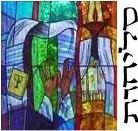
[ The month of Elul marks the beginning of a 40 day "Season of Repentance" in preparation for the High Holidays. This year, the month begins Monday, August 29th at sundown. ]
08.29.11 (Av 29, 5771) The last month of the Jewish calendar (counting from Tishri) is called Elul (אֱלוּל), which begins Monday, August 29th (at sundown) this year. Traditionally, Rosh Chodesh Elul marks the beginning of a forty day "Season of Teshuvah" that culminates on the holiday of Yom Kippur. The month of Elul is therefore a time each year set aside to prepare for the Yamim Nora'im, the "Days of Awe," by getting our spiritual house in order.
During this time we make additional effort to repent, or "turn [shuv] toward God." In Jewish tradition, these 40 days are called Yemei Ratzon (יְמֵי רָצוֹן) - "Days of Favor," since it was during this time that the LORD forgave the Jewish nation after the sin of the Golden Calf (Pirke d'Reb Eliezar). Some have likened these 40 days to the number of days it takes for the human fetus to be formed within the womb.
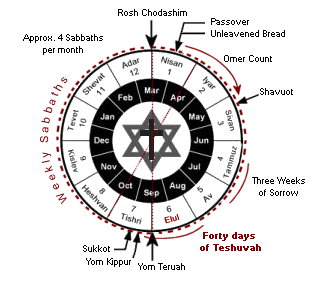
Rosh Chodesh Blessing
The following (simplified) blessing can be recited to ask the LORD to help you for the month of Elul and the forty day "Season of Repentance":
יְהִי רָצוֹן מִלְּפָנֵיךָ יהוה אֱלהֵינוּ וֵאלהֵי אֲבוֹתֵינוּ
שֶׁתְּחַדֵּשׁ עָלֵינוּ חדֶשׁ טוֹב בַּאֲדנֵינוּ יֵשׁוּעַ הַמָּשִׁיחַ אָמֵן
ye·hi ra·tzon mil·fa·ne·kha Adonai E·lo·hey·nu ve·lo·hey a·vo·tey·nu
she·te·cha·desh a·ley·nu cho·desh tov, ba'a·do·ney·nu Ye·shu·ah ha·ma·shi·ach, a·men

"May it be Your will, LORD our God and God of our fathers,
that you renew for us a good month in our Lord Yeshua the Messiah. Amen."

Download Study Card
Note: Rosh Chodesh runs for two days on months that have 30 days, and therefore (since the month of Av has 30 days) both the last day of the current month and the first day of the following month function as the "new moon." If you are confused, simply check a kosher Jewish calendar...
The Call to Teshuvah...
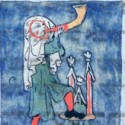
[ The month of Elul marks the beginning of a 40 day "Season of Repentance" in preparation for the High Holidays. This year, the month begins Monday, August 29th at sundown. ]
08.28.11 (Av 28, 5771) Tomorrow evening (at sundow) marks Rosh Chodesh Elul (the "new moon" of the Hebrew month of Elul), which, according to Jewish tradition, was the time when Moses reascended Mount Sinai (the third time) to receive the second set of Tablets from the LORD. Since the tablets were not inscribed until 40 days later (on the 10th of Tishri, the date of Yom Kippur), the days of Elul are considered a time of selichot (prayers for forgiveness) in anticipation of the Ten High Holy Days (Tishri 1-10). For more, see this page.
Beginning on the second day of Rosh Chodesh Elul (and continuing until Erev Rosh Hashanah) the custom is to blow the shofar every day (except on Shabbat). Psalm 27 is often recited every day during this time as well. This practice was adopted to help us "awaken" for the coming High Holidays.
 |
Learn the Shofar Blessing
To help you learn to recite the blessing before sounding (or hearing) the shofar, I designed a Shofar blessing "Study Card" you can download here.
There are four primary types of shofar blasts:
- Tekiah (תְּקִיעָה) - A long single blast (the sound of the King's coronation)
- Shevarim (שְׁבָרִים) - Three short wail-like blasts (signifying repentance)
- Teru'ah (תְּרוּעָה) - Nine staccato blasts of alarm (to awaken the soul)
- Tekiah ha-Gadol (תְּקִיעָה הַגָּדוֹל) - A great long blast (for as long as you can blow!)
The general custom is to first blow tekiah, followed by shevarim, followed by teruah, and to close with tekiah hagadol:
 Listen to the Shofar (click speaker icon) Listen to the Shofar (click speaker icon)
Parashat Shoftim - שופטים
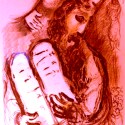
08.28.11 (Av 28, 5771) Our Torah reading for this week is Shoftim ("Judges"), the 48th portion of the Jewish year. In this parashah we find the only passage in the entire Torah where Moses explicitly identifies himself as a prophet of the LORD. Moreover, this is also the only passage where Moses identifies the coming Messiah as "a Prophet like me" (Deut. 18:15; cp. John 6:14). Please read the Torah summary to see how Yeshua our Messiah resembled Moses in no less than thirty ways...
Parashat Shoftim begins with the commandment that the people of Israel should appoint judges (i.e., shoftim: שׁפְטִים) and officers (i.e., shoterim: שׁוֹטְרִים) so that justice would be enforced throughout the promised land. The call for justice and righteousness is famously stated as, "tzedek, tzedek tirdof" (צֶדֶק צֶדֶק תִּרְדּף): "Justice, Justice you shall purse" (Deut. 16:20). The word tzedek means "righteousness" and involves the duty to adhere to moral truth. The act of charity (called tzedakah) is therefore regarded an obligation rather than as gemilut chasadim (i.e., an act of benevolence). The prophet Isaiah wrote (Isa. 32:17): "The work of righteousness (tzedakah) shall be peace" (וְהָיָה מַעֲשֵׂה הַצְּדָקָה שָׁלוֹם), and added that "the service of righteousness (וַעֲבדַת הַצְּדָקָה) shall be quietness and security forever."
Though it is psychologically impossible for us not to judge (the mind must make distinctions in order to function intelligibly), the Talmud states that when we judge mercifully and in accord with the truth, the Divine Presence joins us, but if we act corruptly, we "push" the Presence away and create a sense of exile. Yeshua told us to "whatever you wish that others would do to you, do also to them, for this is the Law and the Prophets" (Matt. 7:12). As we judge others, so we are judged ourselves. Looking at others from a selfish perspective is therefore a form of "bribery" that blinds us to the truth about righteousness (see Deut. 16:19).
Tzedek, tzedek tirdof also means that justice must be pursued in a just manner. The methods used to obtain justice must themselves be just. The Scriptures therefore do not advocate pragmatism or utilitarian thinking. There are no "noble lies" in the Kingdom of Heaven. Violence (verbal or physical) or deception done in the name of God is always a bad idea. We must execute great restraint and caution when we confront oppression in the world. If you want to change the world around you, begin with yourself....
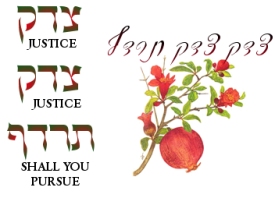 |
Our Torah reading adds, "You must be wholehearted with the LORD your God" (תָּמִים תִּהְיֶה עִם יְהוָה אֱלהֶיךָ) (Deut. 18:13). Notice the little word "with" in this verse (עִם). This verse hearkens to Micah 6:8: "What does the LORD require of you but to do justice (mishpat), and to love kindness (chesed), and to walk humbly (hatznea lechet) with your God?" Having a humble heart walks with the LORD. The word translated "humbly" comes from the same root that gives us the word tzeniut (צְנִיעוּת), meaning modesty or humility. Humility begins with the awareness that 1) there is a God and 2) you are not Him.... It is the practice of "knowing before whom you stand" and living your life in light of this basic truth.
A.W. Tozer wrote: "The humble man will attain a place of soul rest. As he walks on in humility he will be happy to let God defend him. The old struggle to defend himself is over. He has found the peace which humilty brings." May it please the LORD to give us all hearts of genuine humility.
Note: This Monday (August 29th) at sundown is Rosh Chodesh Elul ("Head of the Month of Elul"). Rosh Chodesh Elul actually runs for two days since when a Jewish month has 30 days, both the last day of the month and the first day of the coming month function as the "new moon." For more information about the season of Elul -- and the forty days leading up to the High Holidays -- see the chodesh Elul page.
 |
New Hebrew Meditation:
Shiviti Adonai

08.26.11 (Av 26, 5771) Today I wrote a brief Hebrew meditation ("Shiviti Adonai") based on Psalm 16:8, "I have set the LORD always before me; because he is at my right hand, I shall not be shaken." I hope you will find it encouraging...
There are two great questions God always is asking us. The first is "who do you say that I am?" and the second is "do you love me?" Being in a love relationship with God is the goal of life, the "end of the law," and the reason we were created. But we cannot truly love God apart from understanding his passion for us. The LORD is the Jealous God, a Consuming Fire, who desires all of our heart upon the altar...
"Hope to the LORD (קַוֵּה אֶל־יְהוָה); be strong and strengthen your heart; and (again) hope to the LORD" (Psalm 27:14). There can be no turning to God without genuine hope (תִּקְוָה)... Shabbat Shalom to all you fellow "captives of hope" in our Messiah Yeshua. Stay strong - chazak - and above all else, guard your heart, for from it are the "issues of life." May Yeshua our King be lifted up, exalted, honored, extolled, magnified, and glorified always. Amen.
 |
Remembering who you are...

[ The following entry concerns a verse taken from this week's Torah reading, parashat Re'eh. Please read the Torah portion to "find your place" here. ]
08.25.11 (Av 25, 5771) One of the greatest of sins is to forget who you really are -- a prince or princess of God. Forgetting who you are leads to forgetting who the LORD is, just as forgetting who the LORD is leads to forgetting who you are.... A verse from our Torah reading this week speaks to us along these lines:
בָּנִים אַתֶּם לַיהוָה אֱלהֵיכֶם
לא תִתְגּדְדוּ וְלא־תָשִׂימוּ קָרְחָה בֵּין עֵינֵיכֶם לָמֵת
כִּי עַם קָדוֹשׁ אַתָּה לַיהוָה אֱלהֶיךָ
וּבְךָ בָּחַר יְהוָה לִהְיוֹת לוֹ לְעַם סְגֻלָּה
מִכּל הָעַמִּים אֲשֶׁר עַל־פְּנֵי הָאֲדָמָה
ba·nim at·tem la-Adonai E·lo·hey·khem
lo tit·go·de·du v'lo ta·si·mu kor·chah bein ei·nei·khem la·met
ki am ka·dosh at·tah la-Adonai E·lo·hey·kha
u·ve·kha ba·char Adonai li·yot lo le·am se·gu·lah
mi·kol ha·am·mim a·sher al pe·nei ha·a·da·mah

"You are children of the LORD your God.
You shall not cut yourselves or make any baldness on your foreheads for the dead.
For you are a people holy to the LORD your God,
and the LORD has chosen you to be for him am segulah - a treasured people
out of all the peoples who are on the face of the earth"
(Deut. 14:1-2)

In this verse, Moses reminds the people that they are children of the LORD and therefore they were not to mourn for the dead like those without hope of life beyond the grave... Our God, the Father of Israel, is eternal, and even if our earthly fathers were to die, we will never be orphans, because the LORD, the Everlasting God who is the "God of the spirits of all flesh" (אֱלהֵי הָרוּחת לְכָל־בָּשָׂר), always watches over us: "He will not let your foot be moved; he who keeps you will not slumber" (Psalm 121:3). But if we forget who we are, if we lose sight of our place in the Heavenly Father's heart, then we are likely to fall into a state of excessive and self-destructive mourning over the losses we experience in this world. In the most tragic cases, this can lead to the darkness of unremedied despair, "living among the tombs, crying out and cutting himself with stones" (Mark 5:5). On the other hand, if remember our place at the Father's table as his children, if we take hold that we are beloved of God - his very own "treasured people" - then we will regard the difficulties we encounter in this world as a test of faith intended for our good (Deut. 8:3,16, Jer. 29:11).
Notice further that this passage states that the people were chosen by the LORD to be his own "possession" (i.e., segulah: סְגֻלָּה) from all other peoples in the earth. The grammar here uses a comparative use of the preposition min, meaning "more than" the other peoples of the earth. This idea was first mentioned when God said to the elders at Sinai, "Now therefore, if you will indeed obey my voice and keep my covenant, you shall be my possession more than all other peoples (סְגֻלָּה מִכָּל־הָעַמִּים), for all the earth is mine; and you shall be to me a kingdom of priests and a holy nation" (Exod. 19:5-6). The truth that the Jewish people were specially chosen is repeated elsewhere in Scripture, including Mal. 3:17, Psalm 135:4, Deut. 7:6, 26:18. The word segulah essentially means valuable "personal property," guarded for safe keeping, such as David's treasure of gold and silver which he donated to the Temple (1 Chron. 29:3), or Solomon's treasure collected from the kings and provinces (Eccl. 2:8). Undoubtedly the Jewish people are regarded as a treasured group of people among the nations of the earth...
In addition to being a treasured people (עַם סְגֻלָּה), however, the Jews were also called am nivchar (עַם נִבְחָר), a "chosen people." But what does this mean? What is the point of being "chosen"? Is "chosenness" simply a matter of being a biological descendant of the Jewish patriarchs, or does it mean something more?
In this connection it is helpful to remember that the Hebrew word "Jew" (יְהוּדִי) comes from a root (יָדָה) which means to "thank" or to "praise." The Apostle Paul alluded to this by saying that a Jew whose heart has been circumcised by the Spirit is "one who is praised by God," not by men (Rom. 2:29). Being a Jew therefore means that you are "chosen" to receive special blessings and grace to live in holiness for the glory of God and for the welfare of the world. The performance of various commandments are for the greater purpose of tikkun olam, the "repair of the world," in order to reveal God's goodness and love. Doing so makes a person a Jew, since his praise comes not from man, but from God. God is the source and the power of what makes a true Jew a tzaddik. After all, Israel was meant to be a "light to the nations" (Isa. 42:6; 60:3), and God had always planned for all the families of the earth to come to know Him and give Him glory through Abraham (Gen. 12:3). "Jewishness" is therefore not an end in itself but rather a means to bring healing truth to the nations... Indeed, the entire redemptive story of the Scriptures is about the cosmic conflict to deliver humanity from the "curse" by means of the "Seed of the woman" who would come. Any talk of ancestry, bloodlines, lineage, and so on must be understood as a means to this greater redemptive end.
In fact, a person is never chosen simply on the basis of their genetics or lineage, but because of the personal call and election of God: "For not all who are descended from Israel belong to Israel, and not all are children of Abraham because they are his offspring, but 'through Isaac shall your offspring be named.' This means that it is not the children of the flesh who are the children of God, but the children of the promise are counted as offspring" (Rom. 9:6-8). The idea of chosenness therefore is independent of considerations of "flesh" but is directly related to our response to God's promises.... This was true of "Israel at large" in relation to its faithful subset called she'arit Yisrael (i.e., the faithful remnant), just as it is true of those who embrace the promise of salvation through Yeshua the Messiah.
Therefore the Apostle Peter can refer to followers of Yeshua as "a chosen race, a royal priesthood, a holy nation, a people for his own possession" (1 Pet. 2:9, cp. Ex. 19:6, Deut. 7:6). This is clearly a reference to both Jews and Gentiles who receive Yeshua as their Savior, since he adds: "Once you were not a people (i.e., lo ammi: לא עַמִּי), but now you are God's people; once you had not received mercy (i.e., lo ruchamah: לא רֻחָמָה), but now you have received mercy." (1 Pet. 2:9-10). This echoes the words of the LORD given to the prophet Hosea: "Although it was said to them, "You are not my people," it will be said to them, "You are children of the living God (Hos. 2:23; Rom. 9:25). The Apostle Paul likewise understands Christians to be "chosen people" (Eph. 1:4; 2 Thess. 2:13). Followers of Yeshua are b'kehunat Mashiach - in the priesthood of Messiah Yeshua and therefore have direct access to God (Heb. 4:16, Rev. 1:6). This priestly lineage began with Malki-Tzedek (Melchizedek), to whom Levi gave tithes (Heb. 7:9-10), culminated in Yeshua, and is passed directly to the believer by means of his or her justification and identification with the Lord, "who gave himself for us, that he might redeem us from all iniquity, and purify unto himself a 'peculiar people' (i.e., am segulah: עַם סְגֻלָּה), zealous of good works" (Titus 2:14). The enmity between Jews and Gentiles has been overcome through the sacrificial death of Yeshua. We are made "one new man" (אִישׁ־אֶחָד חָדָשׁ) because of the unfailing love and salvation of our Lord (Eph. 2:11-16).
Within legalistic forms of Messianic Judaism, some non-Jewish believers tend to consider themselves as "second-class" members in the family of God. They often tend to be self-deprecatory, calling themselves "wild olive shoots," "Gentile believers," or even "ger tzedek" (a righteous convert). This is most unfortunate, since it robs these precious souls of their true identity as co-heirs of the Kingdom (Gal. 3:9; Titus 3:7), and it also destroys the unity that Yeshua sought to bring among God's people (John 17:20-23; Eph. 2:14-15).
While it's indeed true that ancient Israel was composed of various classes of people in a hierarchy (priests, Levites, Israelites, women, converts, slaves, etc.), it's clear that Yeshua didn't come to create a "caste system" among His followers. In fact, Yeshua turned things upside-down by saying that the "greatest would be the slave of all" (Mark 10:44; Matt. 18:1-4, Matt. 20:25-28). Whoever would be great in the Kingdom must humble himself and walk hatznea lechet - in childlike simplicity before the Lord (Micah 6:8). Yeshua transposed the all-too-human view of social relationships by inverting the "natural" order. Do you "seek great things for thyself"? Then take hold of your absolute nothingness before the LORD and serve your fellow man (Jer. 45:5). Show gratitude for the gift of life and quit your vain conceits.
וְאַתָּה תְּבַקֶּשׁ־לְךָ גְדלוֹת אַל־תְּבַקֵּשׁ
כִּי הִנְנִי מֵבִיא רָעָה עַל־כָּל־בָּשָׂר נְאֻם־יְהוָה
וְנָתַתִּי לְךָ אֶת־נַפְשְׁךָ לְשָׁלָל
עַל כָּל־הַמְּקמוֹת אֲשֶׁר תֵּלֶךְ־שָׁם
ve·at·tah te·va·kesh le·kha ge·do·lot? al te·va·kesh
ki hi·ne·ni me·vi ra·ah al kol ba·sar, ne·um Adonai
ve·na·ta·ti le·kha et naf·she·kha le·sha·lal
al kol ha·me·ko·mot a·sher te·lekh sham

"And do you seek great things for yourself? Seek them not,
for behold, I am bringing disaster upon all flesh, declares the LORD.
But I will give you your life as a prize of war in all places to which you may go"
(Jer. 45:5)
The Apostle Paul - undoubtedly the greatest Torah sage of the apostolic period - taught that in the Messiah there "is neither Jew nor Greek, slave nor free, male nor female" since we are all one (echad) in the Messiah (Gal. 3:28). But what does this mean? Despite the egalitarian ideal, don't we use these very distinctions to this day? On a fleshly level we certainly do. After all, we clearly distinguish between men and women, rich and poor, slave and free, and various ethnic identities. We all live with these distinctions in the world of basar - the carnal world that is known through sensuous apprehension. However, "from now on we regard no one according to the flesh" (2 Cor. 5:16) but we aim to understand, with the help of God, that a follower of Yeshua is briah chadashah - a "new creation." In the Spirit of God's love we are ish-echad chadash ("one new man") designed to live in unity. k'ish echad, b'lev echad - "as one person with one heart."
God is said to be no "respecter of persons" (Acts 10:34, Rom. 2:11). He is able to make the unclean clean (Acts 10:28) and to regard those who were once called "Not My People" as "My People" (Hos. 2:23, Matt. 3:9). Indeed, a true Jew is one who is circumcised inwardly, someone who has undergone spiritual brit millah - "covenant of the word" (Deut 10:16, 30:6; Rom. 2:28-29, 1 Cor. 7:19, Gal. 5:6; 6:15; Phil. 3:3, Col. 2:11, etc.). Indeed, Paul insisted that any merit obtained either through his pedigree or his adherence to the moral law code is accounted as less than nothing in comparison to the imputed righteousness given by means of his relationship with Yeshua (Phil. 3:3-8).
Chaverim: Regardless of your ethnic background, or your gender, or your social status in this world, understand that you are am segulah (עַם סְגֻלָּה) - precious and elect, and part of the family of God. Do not "cut yourselves" in mourning or regard yourselves as without hope. You are now Kohanim l'El Elyon - priests of the Most High God - "like living stones being built up as a spiritual house, to be a holy priesthood, to offer spiritual sacrifices acceptable to God through Yeshua the Messiah" (1 Pet. 2:5).
 |
New Shabbat "Table Talk" for Re'eh
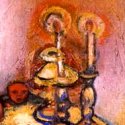
[ The following entry concerns this week's Torah reading, parashat Re'eh. Please read the Torah portion to "find your place" here. ]
08.24.11 (Av 24, 5771) Our Torah portion this week continues Moses' farewell address to Israel just before they entered the land of Canaan. It begins with an appeal that Israel would chose the path of blessing that comes through obedience to the LORD: "See (רְאֵה), I give before you today a blessing and a curse." Moses then went on to remind the people of their duty to eradicate idolatry in the land and to establish a centralized place of worship at a location which the LORD would later identify. He further warned the people both about the rise of false prophets and of the dangers of incorporating any pagan practices into Israelite religious life. The remainder of the portion outlines various commandments that would set Israel apart from other nations, including kashrut, tithing, laws regarding loans, the Sabbatical year, Israelite indentured servants, and the major festivals.
To make it a little easier to discuss some topics, I created a new Shabbat "Table Talk" guide for parashat Re'eh. The guide includes a brief summary of the Torah reading, a set of questions (with answers), and some additional topics for discussion. Hopefully this material will prompt some interesting (and enjoyable) discussion for your Sabbath, chaverim. You can download the PDF file from the linked page (above) or by directly clicking here.
 |
 |
The Choice is Yours...

[ The following entry concerns this week's Torah reading, parashat Re'eh. Please read the Torah portion to "find your place" here. ]
08.23.11 (Av 23, 5771) Our Torah portion begins, "See (רְאֵה), I give before you today a blessing and a curse: the blessing (הַבְּרָכָה), if you obey the commandments of the LORD your God, which I command you today, and the curse (הַקְּלָלָה), if you do not obey the commandments of the LORD your God, but turn aside from the way that I am commanding you today, to go after other gods that you have not known" (Deut. 11:26-28).
We obtain God's blessing (i.e., berakhah: בְּרָכָה) when we obey Him, and our decision to obey manifests the blessed state of walking before the Divine Presence (the direct object marker et (את) before the word "the blessing" alludes to the list of blessings from "Aleph to Tav" given in Lev. 26:3-13). As King David said, "I have set (שִׁוִּיתִי) the LORD always before me..." (Psalm 16:8). David made a choice to "set" the LORD before his eyes, for he understood that opening his eyes to Reality was the only path of real blessing. On the other hand, we obtain God's curse (i.e., kelalah: קְלָלָה) when we close our eyes and "forget" that the LORD is always present.... Suppressing God's truth invariably leads to idolatry, that is, to self exaltation. Note that the root word for the word "curse" (kalal) means to be treated as of little account, and therefore essentially "ratifies" the rebellious heart's attitude toward God. This is middah keneged middah - we are ignored by the LORD as we ignore Him, just as we seen by Him when we truly seek His face (Isa. 55:6-7). So we see that the blessing or the curse really comes from our own inward decision, and God establishes the path we have chosen. As King David said, "God supports my lot" (Psalm 16:5), and Solomon wrote, "The heart of man plans his way, but the LORD directs his steps" (Prov. 16:9).
But if obedience leads to blessing, why do the wicked sometimes prosper? Why do the people of power and influence in this world invariably mock God and His truth? After all, the "kings of the earth set themselves, and the rulers take counsel together, against the LORD and against his Messiah" (Psalm 2:2). In this connection it must be said that the choice to live in godliness was not intended to be trivial or obvious. In this life, the wicked may prosper while the righteous may suffer, but this is in order to refine the righteous as they walk by faith (Deut. 8:16). The Torah states, however, that if you obey, there is only blessing, whereas if you disobey, there is only curse - appearances to the contrary notwithstanding (Deut. 11:26). For the righteous it is always: Gam Zu L'Tovah - "this, too, is for the good" (Rom. 8:28). Therefore, as Moses later will appeal in his discourse to Israel, we are admonished to "choose life" that we might live:
הַעִידתִי בָכֶם הַיּוֹם אֶת־הַשָּׁמַיִם וְאֶת־הָאָרֶץ
הַחַיִּים וְהַמָּוֶת נָתַתִּי לְפָנֶיךָ
הַבְּרָכָה וְהַקְּלָלָה
וּבָחַרְתָּ בַּחַיִּים לְמַעַן תִּחְיֶה אַתָּה וְזַרְעֶךָ
ha·i·do·ti ba·khem ha·yom et ha-sha·ma·yim v'et ha·a·retz
ha·cha·yim ve·ha·ma·vet na·tat·ti le·fa·ne·kha
ha·be·ra·khah ve·ha·ke·la·lah
u·va·char·ta ba·cha·yim le·ma·an ti·che·yeh at·tah ve·zar·e·kha

"I call heaven and earth to witness against you today, that
I have set before you life and death, blessing and curse.
Therefore choose life, that you and your offspring may live"
(Deut. 30:19)
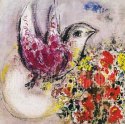
The choice is ours - and ours alone - to make. "See, I am setting before you today a blessing and a curse..." Note that the expression "before you" (לִפְנֵיכֶם) implies that people have choice and free will (bechirah chofshit). Belief in free will coheres with the revelation of God's righteousness, since punishment is fitting only when a person has a genuine choice between doing right and wrong. As Abraham said, "Shall not the Judge of all the earth do what is just?" (Gen. 18:25). Likewise the idea of reward is meaningless if God simply decreed who was to be saintly and who was not. Indeed, the validity of moral choice is implied in the imperatives found in Scripture – "ought implies can." As Yeshua said, "Repent (i.e., shuv: turn to God) - and believe the good news" (Mark 1:15; Rev. 2:5).
Free will is paradoxical in light of God's sovereignty, of course, though the paradox itself is no reason to negate its truth. Most people want to chose either horn of this dilemma (e.g., consider the Calvinism/Arminianism theological controversy), but the truth is that salvation is both about God's sovereignty and your responsibility: "Work out (κατεργάζεσθε) your own salvation with fear and trembling, for it is God who works in you (θεὸς γάρ ἐστιν ὁ ἐνεργῶν ἐν ὑμῖν), both to will and to work for his good pleasure" (Phil. 2:12-13). As we believe, so we are given the means to please our LORD and obey His will. Remember who said, "Behold, I am coming soon, bringing my recompense with me, to repay everyone for what he has done" (Rev. 22:12).
But be encouraged, chaverim. We are promised great help as we obey the message of Yeshua and walk by faith in God's unfailing love.... Those who are in relationship with the LORD through Yeshua are given the Holy Spirit (רוּחַ הַקּדֶשׁ) in the role of Comforter (παρακλητος), who gives us strength to persevere in the midst of the storms of this life (John 14:26; 15:26). Nonetheless, the central commandment remains: We must continually choose to trust in God's love and grace for our lives, every step of the way. God will never leave you nor forsake you (לא יַרְפְּךָ וְלא יַעַזְבֶךָּ), but He continues to say to those who trust in Him: "Behold, I have stood at the door and knocked. If anyone hears my voice and opens the door, I will come in to him and eat with him, and he with me" (Rev. 3:20).
 |
Jeremiah's Assurance...
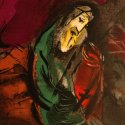
[ The following entry is meant to remind us that despite the certainty of God's judgment upon this world, there remains for us a future and a hope... ]
08.22.11 (Av 22, 5771) In obedience to the word of the LORD, the prophet Jeremiah signed the deed for the purchase of land from his uncle Hanamel, just before Jerusalem was to fall to the Babylonians (Jer. 32:6-10). His land purchase seemed absurd in light of the terror of the times, especially since Nebuchadnezzar's armies were just about to breach the walls of Jerusalem and carry away the inhabitants of Judah to captivity. Under these dreadful circumstances, what possible value did land in the territory of Judah hold? Nonetheless, Jeremiah instructed his scribe Baruch to put the deed of sale in an earthenware vessel "so it would last for a long time" (Jer. 32:11-14). "For thus says the Lord of hosts, the God of Israel: Houses and fields and vineyards shall again be bought in this land" (Jer. 32:15).
Jeremiah's audacious act of faith was surely impressive and testified of God's faithfulness to Israel. After he had given the deed of purchase to Baruch, Jeremiah began to pray to the LORD, saying:
אֲהָהּ אֲדנָי יְהוִה
הִנֵּה אַתָּה עָשִׂיתָ אֶת־הַשָּׁמַיִם וְאֶת־הָאָרֶץ
בְּכחֲךָ הַגָּדוֹל וּבִזְרעֲךָ הַנְּטוּיָה
לא־יִפָּלֵא מִמְּךָ כָּל־דָּבָר
ahah Adonai Elohim
hi·nei at·tah a·si·ta et ha·sha·ma·yim v'et ha·a·retz
be·kho·cha·kha ha·ga·dol u·viz·ro·a·kha han·ne·tu·yah
lo yi·pa·lei mim·me·kha kol da·var

"Ah, Lord GOD!
It is you who have made the heavens and the earth
by your great power and by your outstretched arm!
Nothing is too hard for you"
(Jer. 32:17)
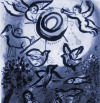
During this prayer before the witnesses, Jeremiah was inwardly troubled regarding the vision to come. As he continued to pray, the absurdity of the situation perhaps began to dawn upon him, as he said: "Behold, the siege mounds have come up to the city to take it, and because of sword and famine and pestilence the city is given into the hands of the Chaldeans who are fighting against it. What you spoke has come to pass, and behold, you see it. Yet you, O Lord God, have said to me, "Buy the field for money and get witnesses" -- even though the city is given into the hands of the Chaldeans" (Jer. 32:24-25). While he was praying this, however, the LORD interrupted and rhetorically quoted back the prophet's own words in the form of a question: "Behold, I am the LORD, the God of all flesh. Is anything too hard for me? (Jer. 32:26-27). Do you really believe this, Jeremiah? Even in light of the certainty of judgment, the LORD has promised to regather the people in genuine teshuvah and hope. Here is the vision: "I will give them one heart and one way, that they may fear me forever, for their own good and the good of their children after them. I will make with them an everlasting covenant, that I will not turn away from doing good to them. And I will put the fear of me in their hearts, that they may not turn from me. I will rejoice in doing them good, and I will plant them in this land in faithfulness, with all my heart and all my soul. For thus says the LORD: Just as I have brought all this great disaster upon this people, so I will bring upon them all the good that I promise them (Jer. 32:37-42).
Later on, Jeremiah still appeared wrestle with the vision. After all, the prophet had spent years warning the people of judgment but the message went entirely unheeded. Now the collapse of the kingdom was imminent, and time had run out... The LORD therefore came to reassure his servant: "The word of the LORD came to Jeremiah a second time, while he was still shut up in the court of the guard. Thus says the Lord who made the earth, the Lord who formed it to establish it -- the LORD is his name: Call to me and I will answer you, and will tell you great and hidden things which you have not known" (Jer. 33:1-3). God did not come to rebuke Jeremiah for his doubt, but to encourage him to ask him about the days to come. It is as if God said to him, "Are you are still questioning my ways in this matter? Come listen again to me and let us review the vision together..." The LORD then repeated the message he spoke earlier, but this time he focused more on its glorious goal. The destruction to come would ultimately be purifying and healing, and one day Zion would be established in great joy, praise and glory for all the earth (Jer. 33:6-9). In that day "there shall be heard again the voice of mirth and the voice of gladness, the voice of the bridegroom and the voice of the bride, the voices of those who sing, as they bring thank offerings to the house of the LORD: "'Give thanks to the LORD of hosts, for the LORD is good, for his steadfast love endures forever!' (הוֹדוּ אֶת־יְהוָה צְבָאוֹת כִּי־טוֹב יְהוָה כִּי־לְעוֹלָם חַסְדּוֹ). For I will restore the fortunes of the land as at first, says the LORD" (Jer 33:11).
Ultimately this great day will come when the LORD will fulfill the promise He made to the house of Israel and the house of Judah: "In those days and at that time I will cause a righteous Branch (צֶמַח צְדָקָה) to spring up for David, and he shall execute justice and righteousness in the land. In those days Judah will be saved, and Jerusalem will dwell securely. And this is the name by which it (i.e., the City, Zion) will be called: Adonai Tzidkenu: 'The LORD is our righteousness' (Jer. 33:14-16).
The word given to the prophet Jeremiah is one for our time: Despite the certainty of coming judgment, there is a future and a hope... Press on in faith, chaverim -- one day (soon) Zion will be established by the hand of Yeshua our Messiah! Meanwhile, hodu la-Adonai ki tov - "Give thanks to the LORD for He is good." As Jeremiah truly prayed, "Nothing is too hard (lit. "wonderful") for the LORD our God...
הוֹדוּ לַיהוָה כִּי־טוֹב כִּי לְעוֹלָם חַסְדּוֹ
הוֹדוּ לֵאלהֵי הָאֱלהִים כִּי לְעוֹלָם חַסְדּוֹ
הוֹדוּ לַאֲדנֵי הָאֲדנִים כִּי לְעלָם חַסְדּוֹ
ho·du la·Adonai ki tov: ki le'o·lam chas·do
ho·du lei·lo·hei ha-E·lo·him: ki le'o·lam chas·do
ho·du la·a·do·nei ha·a·do·nim: ki le'o·lam chas·do

"Give thanks to the LORD, for he is good for his steadfast love endures forever.
Give thanks to the God of gods, for his steadfast love endures forever.
Give thanks to the Lord of lords, for his steadfast love endures forever."
(Psalm 136:1-3)

Parashat Re'eh - ראה

[ The following entry concerns this week's Torah reading, parashat Re'eh. Please read the Torah portion to "find your place" here. ]
08.21.11 (Av 21, 5771) This week's parashah (Re'eh) begins with the portentous words: "See (רְאֵה), I give before you today a blessing and a curse" (Deut. 11:26). Note that the word re'eh is singular ("you see!"), whereas the following pronoun is plural ("before you today"). The sages note that singular form of the verb (i.e., "you see!") is used here to stress that although Torah is freely given to all "who have ears to hear," it's our own personal responsibility to "choose life" and walk its message out in our lives (Deut. 30:19). This has traditionally been understood to mean that God gives each of us the path of goodness (that leads to blessing) and the path of wickedness (that leads to curse). The path we are are choosing, in other words, is ultimately our own choice...
This is an Either/Or of the heart, and there is no place for compromise in this decision. Moreover, since your life is part of a greater whole, you must understand that every deed you do brings to the world around you either a blessing or a curse.... To "correct" the world you live in (תיקון עולם), you must first correct yourself (Matt. 7:5).
An undisputed maxim of the Talmud is: "All is in the hands of God except the fear of heaven (yirat shamayim)" (Berachot 33b; Niddah 16b). In other words, though God constantly showers the world with grace and light, He does not "force" us to revere His Presence but rather leaves that choice with us. God could overwhlem us all so that we had no choice but to see and fear Him, but He "withdraws" Himself and restrains His influence in our lives so that we can exercise faith. The Hebrew word for seeing (ראה) and the word for fearing (ירא) share the same root. We cannot genuinely "choose life" apart from personally seeing it, but we cannot see it apart from the reverence of God. The reverence of God sanctifies our perception and enables us to see clearly. Therefore the righteous "walk by faith, not by sight" (2 Cor. 5:7).
Since our lives are part of a greater whole, we must understand that every deed we do brings to the world around us either a blessing or a curse.... But before we rush out to "bless" the world, however, we must first take pains to undergo self-examination (Matt. 7:5, 2 Cor. 13:5, Gal. 6:3-4). From a place of humility and an awareness of our own frailty are we able to genuinely help others. As Rabbi Israel Salanter once said, "When I was young, I wanted to change the world. I tried, but the world didn't change. So I decided to change my town, but my town didn't change. Then I resolved to change my family, but my family didn't change. Then I realized that I first had to change myself." (I would add, "but then I realized that I couldn't change even myself, so I cried to the LORD for a new heart and He answered my plea...")
Concerning this matter of testing, while we know that we're not permitted to test (נסה) the LORD (Deut. 6:16, Matt. 4:7; Acts 5:9), we are permitted to do so regarding the matter of tzedakah (charity) and the offering of our tithes (Deut. 14:22, cp. Mal. 3:10).
הָבִיאוּ אֶת־כָּל־הַמַּעֲשֵׂר אֶל־בֵּית הָאוֹצָר
וִיהִי טֶרֶף בְּבֵיתִי וּבְחָנוּנִי נָא בָּזאת אָמַר יְהוָה צְבָאוֹת
אִם־לא אֶפְתַּח לָכֶם אֵת אֲרֻבּוֹת הַשָּׁמַיִם
וַהֲרִיקתִי לָכֶם בְּרָכָה עַד־בְּלִי־דָי
ha·vi·u et kol ha·ma·a·ser el bet ha·o·tzar,
vi·hi te·ref be·ve·ti uv'cha·nu·ni na ba·zot, a·mar Adonai Tze·va·ot
im lo ef·tach la·khem et a·ru·bot ha·sha·ma·yim,
va·ha·ri·ko·ti la·khem be·ra·khah ad be·li dai

"Bring the full tithe into the storehouse, that there may be food in my house.
And thereby put me to the test, says the LORD of hosts,
if I will not open the windows of heaven for you
and pour out for you blessing immeasurable."
(Malachi 3:10)

Of course this verse has been abused by unscrupulous TV preachers, etc., but that doesn't mean we should disdain the opportunity to receive blessing from heaven by conscientiously giving as the LORD directs us.... After all, "tzedakah saves from death," and the only thing we can "take with us" when we die is what we have freely given away to others in service to God...
Here is a parable that speaks along this line:
There once happened that a person gave 100 measures as his ma'aser (tithe) each year, for every 1,000 measures of grain that grew. In his will, he commanded his son to always take ma'aser properly.
The first year, the son gave a tenth of 1,000 measures, but then he said to himself, "How can I give so much as a tenth?" The next year he gave only 90 measures, but then only 900 measures grew. The third year he gave only 80, but only 800 grew. With each ten measures that he took away, his field was diminished by 100 measures, until it yielded only 100 measures, the amount that had originally been given as a tenth....
For this reason the Torah says, Give ma'aser so that you will be able to give it again and remain wealthy. (Tzenah Ur'enah)
The whole idea of giving is counterintuitive to the egoism of our natural perspective, and therefore the giving person testifies that he or she is seeing the truth of God's reality and kingdom in the universe.... Stated simply: Hardening our hearts to the needs of others is an act of unbelief.
A verse in our parasha speaks directly to this. Deuteronomy 15:10 says, "You shall give to him freely, and your heart shall not be grudging when you give to him, because of this thing the LORD your God will bless you in all your work and in all that you undertake." The sages note that the phrase because of this thing (בּגְלַל הַדָּבָר הַזֶּה) hints that "the world goes in a circle." Today one is rich; tomorrow the other is rich. This is inferred from the connection between the word "because" (בִּגְלַל) and the word for "circle" (גַּלְגָל), both of which share the same root (גלל). Indeed, the sages consider the act of giving (tzedakah, i.e., charity) as one of the greatest of commandments, since it is the essence of God to give to His creation, and it is through giving that we are enabled to see the Divine Presence, as it is written in Psalm 17;15, "I will see your face in righteousness (tzedakah)" (אֲנִי בְּצֶדֶק אֶחֱזֶה פָנֶיךָ).
The LORD "brings us into the land" in order to serve Him and others in grace and love. The commandment to practice tzedakah (charity) and shemitat kesafim (the forgiving of debts) are intended to promote a dignified society of people that care for one another as mishpachah (family). Thus are we called to be am segulah - a treasured people - forming a community of chesed (love) and beauty for the glory of our Messiah (1 Pet. 2:9).
Note: Prayer request for provision... Like many of you, we are in debt and it's getting somewhat precarious over here. I ask for your prayers - that our Lord will provide. Thank you, chaverim.
 |
Captives of Hope...

08.19.11 (Av 19, 5771) It's not always easy to wait for God: "Hope deferred makes the heart sick" (Prov. 13:12). An old Jewish prayer, uttered somewhat wistfully, begins, "O Lord, I know that Thou wilt help us; but wilt Thou help us before Thou wilt help us?"
The Scriptures are filled with desperate cries of the heart... "How long, O LORD? Will you forget me forever? How long will you hide your face from me? How long must I take counsel in my soul and have sorrow in my heart all the day?" (Psalm 13:1-2). "Make haste to help me, O LORD, my salvation!" (Psalm 38:22). "My soul melts away for grief; strengthen me according to your word" (Psalm 119:28). "Answer me quickly, O LORD! My spirit fails! Hide not your face from me, lest I be like those who go down to the pit" (Psalm 143:7). Ultimately there can be no turning to God, no teshuvah, apart from the presence of hope (תִּקְוָה).
קַוֵּה אֶל־יְהוָה חֲזַק וְיַאֲמֵץ לִבֶּךָ
וְקַוֵּה אֶל־יְהוָה
ka·veh el Adonai cha·zak ve'ya·metz lib·be·kha,
ve-ka·veh el Adonai

"Hope to the LORD; be strong and let your heart be strengthened;
and (again) hope to the LORD"
(Psalm 27:14)
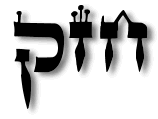
In this famous verse, the imperative verb kaveh (often translated as "wait") might better be rendered as "look for with anticipation!" or "hope!" (the root of this verb actually appears in the Hebrew word for hope: "tikvah"). Hope in the Lord and chazak! - "be strong" (the Septuagint translates chazak as andridzou - "act like a man"). That is, hope in the Lord, be stouthearted and decisive in your conviction, and then the LORD will instill courage within your heart (the verb ametz is hiphil, meaning that it is God who produces the courage within you). But note the order here: You must first step out in faith, obeying the commandment to hope in the LORD, and then God will fill your heart with courage....
בָּרוּךְ אַתָּה יהוה אֱלהֵנוּ מֶלֶךְ הָעוֹלָם
אֲשֶׁר עָשָׂנוּ אֲסִירֵי תִּקְוָה
ba·rukh at·tah Adonai E·lo·hei·nu me·lekh ha·o·lam,
a·sher a·sa·nu a·si·rei tik·vah

"Blessed art You, LORD our God, King of the universe,
who has made us captives of hope."
When we put our hope in the LORD, strong in our conviction, we will be given courage to bear whatever may befall us - and this is help indeed during these perilous days! "Hope to the LORD (קַוֵּה אֶל־יְהוָה); be strong and strengthen your heart; and (again) hope to the LORD." There can be no turning to God without genuine hope (תִּקְוָה). Indeed, as the Apostle Paul wrote: "We are saved by hope" (Romans 8:24).
Judah, who is now two years old...
Shabbat Shalom to all you fellow "captives of hope" in our Messiah Yeshua. Stay strong - chazak - and above all else, guard your heart, for from it are the "issues of life" (Prov. 4:23). May Yeshua our King be lifted up, exalted, honored, extolled, magnified, and glorified always. May He come SOON, in our days -- and may we be ready!
Testing Messianic Ministries...

08.19.11 (Av 19, 5771) Someone wrote me recently asking for my opinion regarding certain other Messianic teachers, many of whom I had never heard of before. Since I rarely have time to evaluate the content of these ministries, I simply reminded this friend to exercise discernment and to "test the spirits" of those who purport to teach God's truth....
Because false teachers abound in the world, each of us is obligated to test (δοκιμάζω, lit. "determine if a metal is pure") the thinking of others to see if they are truly children of God (1 John 4:1). We must test people's truth claims, especially those who purport to be speaking on behalf of the Living God.... When confronted by false teaching, we are called to "earnestly contend for" (ἐπαγωνίζομαι, lit. "wrestle over") the truth of the faith (Jude 1:3). That's the response to untruth. On the other hand, we are commanded to "always be ready" to provide a reason (λόγος) for the hope that is within us (1 Pet. 3:5). That's the call to be a witness to the truth...
We are explicitly commanded to ask God for heavenly wisdom (James 1:5), though this is "not a wisdom of this age or of the rulers of this age, who are doomed to pass away" (1 Cor. 2:6-7). Indeed, the gospel message itself is called the power and wisdom of God (1 Cor. 1:21-24). Disciples of Yeshua are to have the "mind of the Messiah" (1 Cor. 2:16). We can guard against false teachers by using discernment to test their spirits, but we can only be equipped to do so if we "build ourselves up in the most holy faith" (Jude 1:20). We build ourselves up by carefully studying the word of God so that we will be able to accurately wield the Sword of the Spirit (2 Tim. 2:15-16, 2 Pet. 1:19-20). In order to grow, we must have "good soil" for the seed of the word to take root. We "get rooted by knowing the roots" of our faith! Studying the Scriptures and praying in the Holy Spirit keeps us securely in the love of God as we wait for the mercy of Yeshua who gives us eternal life (Jude 1:21).
As I've written about elsewhere, we are "epistemologically" responsible to walk in the Spirit of truth and to reject what is false (1 John 4:6). This implies that we have a moral and spiritual duty to think clearly and not abuse our minds (Phil. 4:8; Rom. 12:2). God Himself helps us to do this: "I will ask the Father, and he will give you another Helper (παράκλητος, someone "called to one's side"), to be with you forever, even the Spirit of Truth (רוּחַ הָאֱמֶת), whom the world cannot receive, because it neither sees him nor knows him" (John 14:16-17). God gives us the Spirit of Truth so that we can know the truth about His salvation and to "discern what is the will of God, what is good, acceptable, and perfect" (Rom. 12:2).
Whenever we encounter other ministries, there are some practical things we can do to guard ourselves from being deceived. There are several questions we can ask those who claim they are teaching the truth of God. The first question we should ask - the one that precedes all others - is who do they say that Yeshua is (Matt. 16:15)? Is the glory of Yeshua the focus, or is something else? The role of the Holy Spirit is to glorify the Messiah, God's Son (John 16:14), so if He is not being honored and esteemed as the LORD of Glory, then that is a "red flag" regarding the ministry in question. Test to see if the teacher (or ministry) plainly confesses that Yeshua is the LORD (יהוה), the very Creator who became flesh, or attempt to detect whether they relegate the "Messiah" to more earthly terms (John 1:1,14). "Those who honor the Son are the ones who honor the Father" (John 5:23); and, "whoever hates the Son hates the Father also" (John 15:23). Even the most brilliant Torah scholar is in spiritual darkness if he or she rejects the truth that Yeshua is the LORD and Master of all. Do these ministries teach that Yeshua is the Creator, Sustainer, and LORD of all reality? Is Yeshua lifted up as the Holy One of Israel, the King of Israel, the Redeemer of Israel? Is Yeshua recognized as the Judge of the living and the dead, to whom every knee shall one day bow as LORD?
Second, does the teacher in question advocate some sort of "special name" for God other than (or over and above) the name of Yeshua? Are they part of the "Sacred Name" movement (i.e., cult)? Do they openly confess that Yeshua is the "Name above all Names" (Phil. 2:9-11), or do they waffle on this question and focus instead on the name YHVH? Do they spend an exorbitant amount of time and energy on the phonetics of the name of God, offering permutations or linguistic variations while overlooking the fact that the Name refers to Something beyond the merely linguistic? Do they disdain the name Jesus or ridicule Christians who use the name "Christ," regarding them as "pagan" or "Gentile"? Do they attempt to impress you with the secret meaning of Hebrew words and spurious intellectualism? Do they suggest that Christian theology is inherently suspect? Do they mock the idea of the Trinity as incoherent or unbiblical? Do they miss the point of God's revelation by taking the Name of the LORD in vain?
"I, I am the LORD (יְהוָה), and besides me there is no Savior (מוֹשִׁיעַ). For I am the LORD your God, the Holy One of Israel, your Savior. This is what the LORD, Israel's king and His Redeemer, the LORD of Hosts (יְהוָה צְבָאוֹת) says: "I am the first and I am the last, there is no God but me." "For to us a child is born, to us a son is given; and the government shall be upon his shoulder, and his name shall be called Wonderful Counselor, Mighty God, Everlasting Father, Prince of Peace." (Isa 43:3, 11, 44:6; cp. Jude 1:25, Rev. 1:17; 22:13; Isa. 48:12; 9:6).
Third, do these ministries disparage or otherwise minimize the writings of the Apostle Paul? Do they quibble over Paul's view of the "law" or attempt to reinterpret his words to mean that we are still obligated to observe the rules and regulations given to Israel at Sinai? Do they suggest that Paul wrote only "midrash"? Do they regard the writings of Paul as having the same authority as that of Moses? Do they attempt to argue that the "new covenant" isn't really all that "new," and should instead be understood as a "renewed" covenant? Do they attempt to "explain away" the clear meaning of the book of Galatians and the book of Hebrews regarding the believer's relationship to the law of Moses? Do they impugn the Greek New Testament or claim that the Aramaic Peshitta or some long-lost Hebrew text is more accurate than the Koine Greek documents we have today? Do they attempt to reconstruct or redefine the Greek text by speculating that there is an earlier text that is the "real" Scripture? Do they advocate Bible codes or Hebrew "pictograms" as some sort of "key" to unlock the secrets of the Scriptures? Beware, chaverim.....
Fourth, do these ministries teach that salvation comes through trusting in the finished work of Yeshua alone, or do they add something else to the mix? Do they claim that we should become kosher or obey the law of Moses in order to "really" understand or follow Yeshua? A true teacher of the gospel message will present the liberty of God's grace as grace, not as "grace +" something else. When Yeshua cried out, "It is finished" (tetelestai), he proclaimed that all that was required to bring us to eternal life was accomplished through his death the cross. Yeshua - alone - is the Savior, and we are to trust in His works for our righteousness - not in our own. As the Apostle Paul taught, "The Messiah is the end of the law (τέλος νόμου) for righteousness to everyone who believes" (Rom. 10:4). All that the law attempted to do for us is fulfilled and completed and perfected and realized in Yeshua the Messiah. We add NOTHING to His finished work...
Fifth, how do these teachers regard the idea of "sanctification"? Do they regard the process of spiritual growth (and obedience) as an expression of God's grace, or are there "strings attached" to God's acceptance and love? Do these ministries advocate either "Torah observance" or Jewish mysticism (i.e., "kabbalah") as a means of sanctification? Do they claim Yeshua was either a mystic who taught higher consciousness as the way to know God or a Pharisee who was attempting to restore the true meaning of the law? Do they claim that Jewish believers are required to be "Torah Observant" while Gentile believers are merely "invited" to experience the "deeper life" by doing so? Do they still put up a "dividing wall of separation" between the Jew and the Gentile in the Messiah? Do they faithfully teach the truth of the "one new man" that is created in the Messiah (Eph. 2:11-22)?
Sixth, how do these ministries understand the idea of the law? Do they advocate following Moses or Yeshua? Do they confuse the idea of Torah (instruction) with the terms of the covenant given at Sinai? Do they mistakenly equate "Torah" with mishpatim ("rules"), chukkim ("statutes"), and so on? Are they confused about what the law at Sinai actually means, or what purpose it serves? How do they understand statements in the New Testament that clearly teach that the law of Moses was a "shadow" (σκιά) of the greater Substance the Messiah came to give to us (Heb. 10:1)? How do they understand the "law of the Messiah" (Gal. 6:2)? Are they offended by the Cross of Yeshua, or do they stumble over the message of the cross? Do they advocate an "observational calendar" based on the lunar cycles and the first appearance of barley in the month of Aviv? Do they disparage the traditional Jewish calendar as being corrupt? Do they argue that true followers of Yeshua must observe the Jewish holidays or Shabbat? Beware, chaverim....
Seventh, how do these ministries regard the idea of the "church"? Do they understand that the church, as a called out assembly from every tribe and tongue, has a destiny and purpose different than ethnic Israel, or to they attempt to identify the church with Israel (e.g., by saying that the church constitutes the "House of Ephraim" or the "Ten Lost Tribes" of Israel, etc.)? Do they react so strongly to the error of "replacement theology" that they attempt to deny that the church is a valid institution at all? Do they offer any clear teaching on Paul's letters to the various assemblies of his day, instructing them about the order of services and the role of various people within the assembly?
Of course a good deal more could be said about this subject - and there are many additional pages on this web site that might help you further - but asking these sorts of questions should help you to "test the spirits" in order to discern whether a "Messianic" ministry is really kosher -- or not.
 |
New Shabbat "Table Talk" for Ekev

[ The following entry concerns this week's Torah reading, parashat Eikev. Please read the Torah portion to "find your place" here. ]
08.18.11 (Av 18, 5771) This portion of Torah continues Moses' farewell address to Israel and includes some of the most fundamental texts of the Jewish Scriptures, including the second part of the Shema (the duty to love God) and the commandments of tefillin and mezuzot. To make it a little easier to discuss some topics, I created a new Shabbat "Table Talk" guide for parashat Eikev. The guide includes a brief summary of the Torah reading, a set of questions (with answers), and some additional topics for discussion. Hopefully this material will prompt some interesting (and enjoyable) discussion for your Sabbath, chaverim. You can download the PDF file from the linked page (above) or by directly clicking here.
A verse that provides some consolation during these perilous times is found in this week's reading. The princes of this world are on notice: The LORD (יְהוָה), the "God of gods" and "Lord of lords" loves justice (Deut. 10:17). God's recompense is coming. He will one day shatter the nations with a rod of iron and dash them in pieces like a potter's vessel.
כִּי יְהוָה אֱלהֵיכֶם הוּא אֱלהֵי הָאֱלהִים
וַאֲדנֵי הָאֲדנִים הָאֵל
הַגָּדל הַגִּבּר וְהַנּוֹרָא
אֲשֶׁר לא־יִשָּׂא פָנִים וְלא יִקַּח שׁחַד
ki Adonai E·lo·hey·khem hu E·lo·hei ha-E·lo·him
va·a·do·nei ha-a·do·nim,
ha-El hag-ga·dol hag-gib·bor ve·ha-no·ra
a·sher lo yis·sa fa·nim ve·lo yik·kach sho·chad

"For the LORD your God is God of gods
and Lord of lords,
the great, the mighty, and the awesome God,
who is not partial and takes no bribe"
(Deut. 10:17)
The LORD "executes justice for the orphan and the widow, and loves the sojourner, giving him food and clothing" (Deut. 10:18). As the entire story of the Exodus reveals, God hates oppression and exploitation and will eventually intervene to deliver His people by destroying the Pharoah's of this age... "Behold, I am coming soon, bringing my recompense with me, to repay everyone for what he has done" (Rev. 22:12). Even so, come quickly, Yeshua!
Note that Rosh Chodesh Elul - the start of the 40 days of teshuvah - begins Monday, August 29th year, with Yom Teruah/Rosh Hashanah beginning on Wednesday, Sept. 8th at sundown.
Blessings and Brokenness

[ The following entry concerns this week's Torah reading, parashat Eikev. Please read the Torah portion to "find your place" here. ]
08.16.11 (Av 16, 5771) Our Torah portion this week includes the following verse: "And now Israel, what does the LORD your God ask from you but only to fear (לְיִרְאָה) the LORD your God, to walk (לָלֶכֶת) in all His ways, to love (לְאַהֲבָה) Him, and to serve (לַעֲבד) the LORD your God with all your heart and all your soul?" (Deut. 10:12):
וְעַתָּה יִשְׂרָאֵל מָה יְהוָה אֱלהֶיךָ שׁאֵל מֵעִמָּךְ
כִּי אִם־לְיִרְאָה אֶת־יְהוָה אֱלהֶיךָ לָלֶכֶת
בְּכָל־דְּרָכָיו וּלְאַהֲבָה אתוֹ וְלַעֲבד אֶת־יְהוָה
אֱלהֶיךָ בְּכָל־לְבָבְךָ וּבְכָל־נַפְשֶׁךָ
ve·at·tah Yisrael, mah Adonai E·lo·hey·kha sho·el me·im·makh
ki im le·yir·ah et Adonai E·lo·hey·kha la·le·chet
be·khol de·ra·khav ul·a·ha·vah o·to, ve·la·a·vod et Adonai
E·lo·hey·kha be·khol le·vav·kha uv·khol naf·she·ka?

"And now, Israel, what does the LORD your God require of you,
but to fear the LORD your God, to walk in all his ways, to love him,
to serve the LORD your God with all your heart and with all your soul?
Traditional Judaism believes in personal responsibility as expressed through the exercise of the human will. This is summarized in the well-known maxim of the Talmud: "All is in the hands of God except the fear of heaven" (Berachot 33b; Niddah 16b). In his commentary on the verse quoted above, Rashi noted that when God asked Israel "only to fear" Him, this implied that He voluntarily withdrew His sovereign control over human beings so that no one would be overwhelmed or "forced" into serving Him. God gives to each soul the path of goodness (that leads to blessing) and the path of wickedness (that leads to curse). Paradoxically, we are "forced" to freely choose whether to live as a tzaddik (righteous person of faith) or as a rasha (idolatrous person of unbelief) -- and we cannot not choose! Ultimately, the choice whether or not to turn to God is the only real one we have, since it determines everything else we see and do...
It is interesting to note that the sages of the Tosafot (i.e., the commentary found on the outer margin and opposite Rashi's notes in the Talmud) quote a different statement regarding this verse: "All is in the hands of Heaven except for thorns (tzinim) and snares (pachim)." This apparently comes from the Book of Proverbs: "Thorns (צִנִּים) and snares (פַּחִים) are in the path of the perverse; (but) he who guards his soul will distance himself from them" (Prov. 22:5).
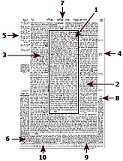
R' Yaakov said, "This world is like a corridor before the World to Come; prepare yourself in the corridor, that you may enter into the hall" (Pirke Avot 4:21). God sets "thorns and snares" within the "corridor" here to test us in our way. If we are perverse, we will find ourselves injured and stuck through various circumstances of our own making. The one who "guards his soul," however, will steer clear of these things and therefore be spared much tzuris and heartache. This is consonant with the teaching of the New Testament: "Do not be deceived: God is not mocked, for whatever one sows, that will he also reap" (Gal. 6:7). Our moral choices do indeed matter and affect our experience of life. Some things, such as our DNA, our intelligence, the conditions that surround us in history, and so on, are indeed beyond our control, but we all nontheless face "thorns and snares" to circumnavigate if we are to turn away from perversity and guard our souls, as the Proverb instructs.
What the LORD asks from us is simply the impossible, since the human heart is unable to truly love and serve the LORD apart from intervening grace (Eph. 2:1-10). The real miracle of faith is found in a transformed heart. It is never a question of "willpower" or the "zeal" of man; no - it is never a question of what I can do but rather what God can do (John 1:13).
דֶּרֶךְ־מִצְוֹתֶיךָ אָרוּץ כִּי תַרְחִיב לִבִּי
de·rekh mitz·vo·te·kha a·rutz, ki tar·chiv lib·bi

"I will run in the way of your commandments
when you enlarge my heart"
(Psalm 119:32)
However, it seems to be the pattern of God's grace to bring affliction and trouble into our lives so that we will begin to seek the Presence of God. After all, how many of us came to know the LORD apart from the pain that comes from apprehending our own inner brokenness? "Truly, truly, I say to you, unless a grain of wheat falls into the earth and dies, it remains alone; but if it dies, it bears much fruit" (John 12:24). The hard "outer shell" of the seed must be broken so that the life of the Spirit can come through... The commandment to love the LORD, then, only finds its voice after we come to faith, after we experience the Holy Spirit's power, indeed, after we are made alive from the dead.... The ultimate aim of the various "thorns and snares" of life, then, is to "wake us from our slumbers" to reveal the way of life... As C.S. Lewis once said, "God whispers to us in our pleasures, speaks to us in our conscience, but shouts in our pains: It is His megaphone to rouse a deaf world."
 |
Keep pressing on, chaverim! God in His infinite wisdom uses troubles and brokenness in our lives so that we can make the only choice that really matters: to turn to Him for healing.
אָמַרְתְּ לַיהוָה אֲדנָי אָתָּה
טוֹבָתִי בַּל־עָלֶיךָ
a·mar·t' la-Adonai, A·do·nai at·tah,
to·va·ti bal a·ley·kha

I say to the LORD, "You are my Lord;
I have no good apart from you"
(Psalm 16:2)
"It is for You and not for me that I stand before You..." Everything we receive is through God's chesed, His love and grace...
Parashat Eikev - עקב
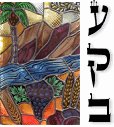
[ The Torah reading for this week is parashat Eikev, traditionally read during Shabbat Vatomer, the second "Sabbath of consolation" after Tishah B'Av. ]
08.15.11 (Av 15, 5771) The Torah portion for this week (Eikev) includes the famous statement: "Man does not live by bread alone, but from everything that comes from the mouth of the LORD shall he live" (Deut. 8:3). Note that our Lord Yeshua quoted this verse when he was tested with physical hunger in the wilderness (Matt. 4:3-4).
כִּי לא עַל־הַלֶּחֶם לְבַדּוֹ יִחְיֶה הָאָדָם
כִּי עַל־כָּל־מוֹצָא פִי־יהוה יִחְיֶה הָאָדָם׃
ki lo al-ha·le·chem le·va·do yich·yeh ha·a·dam;
ki al-kol-mo·tza fi-Adonai yich·yeh ha·a·dam

"Man does not live on bread alone, but by everything that comes
from the mouth of the LORD does man live."
(Deut. 8:3)

Hebrew Study Card
Eating is inherently a sacrificial act: We must "eat life" in order to live.... But while physical food helps us survive, we must ask the question, for what end? Do we live for the sake of eating (and thereby live to eat for another day, and so on), or do we eat in order to live? If the latter, then what is the goal of such life? What is the source of its nutrient and where is it taking you? What does your soul or "inner man" feed upon to gain the spiritual will to live?
Both the written Torah and Yeshua (who is the embodiment and expression of Torah) make it clear that we receive sustenance from the Word of God (דְּבַר הָאֱלהִים), the Source of spiritual life. But the word of God itself is a message of the very love of God (אַהֲבַת הָאֱלהִים) that is always sustaining us -- whether we are conscious of this or not. After all, for those of us who understand our brokenness and radical dependence, what "word" could we possibly endure were it not His words of hope, consolation, and even endearment? The Love of God is our life, chaverim, and the love of God is most clearly seen in the life and sacrificial death of Yeshua the Messiah...
אָנכִי הוּא לֶחֶם הַחַיִּים
כָּל־הַבָּא אֵלַי לא יִרְעָב
וְכָל־הַמַּאֲמִין בִּי
לא יִצְמָא עוֹד לְעוֹלָם
anochi hu lechem ha-chayim,
kol haba elai lo yirav,
vekhol hama'amin bi
lo yitzma od le'olam

"I am the bread of life.
The one who comes to me will never go hungry,
and the one who believes in me
will never be thirsty."
(John 6:35)

God cleaves to us and therefore calls us to cleave to Him in return (devakut). Some scholars think that the Hebrew word for seeing (ראה) and the word for fearing (ירא) share the same root, and therefore we can close our spiritual eyes by not revering the works of the LORD. Similarly, we can close our spiritual ears by not heeding to His words of love for our soul...
Our very spiritual life -- its source and its end -- depends upon receiving the word of the Living God who is King of Eternity (אֱלהִים חַיִּים וּמֶלֶךְ עוֹלָם). He speaks words of hope and love to those who attend themselves to His Presence. Taste and see that the LORD is good (טַעֲמוּ וּרְאוּ כִּי־טוֹב יְהוָה). May you hear Him speaking to you now...
Shabbat Va'Tomer
This coming Shabbat is the second "Sabbath of consolation" (after Tishah B'Av), traditionally called Vatomer Tzion, based on the Haftarah reading that begins: וַתּאמֶר צִיּוֹן, "And Zion shall say..." (Isa. 49:14). As the prophets repeatedly state in the Name of the LORD, God will never abandon Zion: "Can a woman forget her nursing child, that she should have no compassion on the son of her womb? Even these may forget, yet I will not forget you. Behold, I have engraved you on the palms of my hands; your walls are continually before me" (Isa. 49:15-16). The Haftarah concludes by Isaiah saying that the LORD will comfort the Mountain of Zion by making it like the Garden of Eden, with joy and happiness within her, along with thanksgiving and the sound of song.
Note: The month of Elul begins in just a couple of weeks (i.e., on Tuesday August 30th this year), which initiates the month-long time of preparation for the Jewish High Holidays. This means that Rosh Hashanah will begin in about six weeks (i.e., Sept. 28th at sundown). During the time leading up to the High Holidays, it is customary to engage in cheshbon ha-nefesh ("soul searching") and to derive comfort that God is forgiving and loving to those who turn to Him. The sages chose the seven "Haftarot of comfort" to encourage us to make our hearts ready for the upcoming High Holiday Season.
 |
A Jewish "Valentine's Day"? 

[ The romantic holiday of Tu B'Av begins at sunset on Sunday, August 14 this year... ]
08.14.11 (Av 14, 5771) Hebrew letters can be used to express numbers. Joining the letters Tet (9) and Vav (6), for example, equals the number 15, sometimes written as the acronym "Tu" (ט"ו). The phrase "Tu B'Av" (ט"ו באב) indicates the 15th day of the month of Av (אָב), a "full-moon" holiday that has been celebrated as a day of love and affection since Biblical times (i.e., "the holiday of love," chag ha-ahavah: חַג הָאַהֲבָה). In modern Israel it is customary to send a bouquet of red roses to the one you love on Tu B'Av. Romantic songs are played on the radio and parties are held in the evening throughout the country. This year Tu B'Av occurs Sunday, August 14th and runs through Monday, the 15th.
The first mention of Tu B'Av is found in the Mishnah, where Shimon ben Gamliel is quoted as saying, "There were no better (i.e. happier) days for the people of Israel than the Fifteenth of Av and Yom Kippur, since on these days the daughters of Israel go out dressed in white and dance in the vineyards. What were they saying: Young man, consider whom you choose to be your wife... (Taanit, Chapter 4).

Since it is the "last" festival of the Jewish year, prophetically Tu B'Av pictures our marriage to the Lamb of God (Seh Elohim), the LORD Yeshua our beloved Messiah. On a soon-coming day those who belong to the LORD and are faithful to follow His ways will be blessed with the unspeakable joy of consummating their relationship with Him. This is heaven itself - to be in the Presence of the LORD and to be His beloved (Rev. 19:6-9).
For more about Tu B'Av, click here.
New Table Talk for Va'etchanan

[ The following entry concerns this week's Torah reading, parashat Va'etechan. Please read the Torah portion to "find your place" here. ]
08.12.11 (Av 12, 5771) Our Torah portion this week is very rich and includes some of the most fundamental texts of the Jewish Scriptures, including the Ten Commandments, the Shema (the duty to love God and study Torah), and the commandments of tefillin and mezuzot. To make it a little easier to discuss some topics, I created a new Shabbat "Table Talk" guide for parashat Va'etchanan. The guide includes a brief summary of the Torah reading, a set of questions (with answers), and some additional topics for discussion. Hopefully this material will prompt some interesting (and enjoyable) discussion for your Sabbath, chaverim. You can download the PDF file from the linked page (above) or by directly clicking here.
This portion of Scripture includes the great Ve'ahavta ("you shall love") portion of the Shema, the inner meaning and "heart" of the previously stated Ten Commandments. It is prefaced with the following words: "Now this is the commandment (וְזאת הַמִּצְוָה), the statutes and the rules, that the LORD your God commanded me to teach you... that you may fear the LORD your God, you and your son and your son's son, by keeping all his statutes and his commandments, which I command you, all the days of your life, and that your days may be long. Hear therefore, O Israel, and be careful to do them, that it may go well with you, and that you may multiply greatly, as the LORD, the God of your fathers, has promised you, in a land flowing with milk and honey" (Deut. 6:1-3). Immediately following this we read:
שְׁמַע יִשְׂרָאֵל יְהוָה אֱלהֵינוּ יְהוָה אֶחָד
וְאָהַבְתָּ אֵת יְהוָה אֱלהֶיךָ
בְּכָל־לְבָבְךָ וּבְכָל־נַפְשְׁךָ וּבְכָל־מְאדֶךָ
וְהָיוּ הַדְּבָרִים הָאֵלֶּה אֲשֶׁר אָנכִי מְצַוְּךָ הַיּוֹם עַל־לְבָבֶךָ
וְשִׁנַּנְתָּם לְבָנֶיךָ וְדִבַּרְתָּ בָּם בְּשִׁבְתְּךָ בְּבֵיתֶךָ
וּבְלֶכְתְּךָ בַדֶּרֶךְ וּבְשָׁכְבְּךָ וּבְקוּמֶךָ
וּקְשַׁרְתָּם לְאוֹת עַל־יָדֶךָ וְהָיוּ לְטטָפת בֵּין עֵינֶיךָ
וּכְתַבְתָּם עַל־מְזוּזת בֵּיתֶךָ וּבִשְׁעָרֶיךָ
Shema · Yisrael · Adonai · Elohenu · Adonai · echad
ve'ahavta · et · Adonai · Eloheykha
bekhol · levavkha · uv'khol · nafshekha · uv'khol · me'odekha
ve'hayu · ha-devarim · ha'eleh · asher · anokhi · mitzavkha · ha-yom · al · levavekha
ve'shinantam · levanekha · ve'dibarta · bam · be'shivtekha · be'vetekha
uv'lekhtekha · va'derech · uv'shokhbekha · uv'kumekha
uk'shartam · le'ot · al · yadekha · ve'hayu · le'totafot · bein · einekha
ukh'tavtam · al · mezuzot · betekha · u'visharekha

"Hear, O Israel: The LORD our God, the LORD is one.
You shall love the LORD your God with all your heart
and with all your soul and with all your might. And these words
that I command you today shall be on your heart. You shall teach them
diligently to your children, and shall talk of them when you sit in your house,
and when you walk by the way, and when you lie down, ane when
you rise up. You shall bind them as a sign on your hand, and they shall
be as frontlets between your eyes. You shall write them on the doorposts
of your house and on your gates."
(Deut. 6:4-9)

Hebrew Study Card
Note that in the Torah scroll, the two letters Ayin (ע) and Dalet (ד) are enlarged in the first sentence of the Shema, marking its significance in the surrounding text. Together, these letters form the word 'ed (עֵד), which means "witness," suggesting that the Shema is a testimony of the sovereignty of God and our primary duty to love Him with our whole being.
Because God is One - echad (not yachid) - the very great commandment is to become one with Him in love: HEAR, O ISRAEL, THE LORD OUR GOD IS ONE - and (therefore) you SHALL LOVE the LORD b'khol levavkha - "with all your heart," uv'khol nafshekha - "with all your soul," and uv'khol me'odekha - with all your "muchness." The message of the Shema is that you are called to partake of His unity in love (read Yeshua's words here: John 17:11,22-23).
Some other gems from this portion include the verse: "Out of heaven he let you hear his voice, that he might discipline you" (Deut. 4:36). The verb "discipline" here is yasar, from which we get the word musar (מוּסָר), meaning correction, ethical instruction, and so on.... It is a word used to describe the instruction a good father would give his son regarding moral cause and effect and spiritual truth.
Why did God chose you and set His love upon you? Why are you am segulah - a treasured people? Simply because He loves you and is faithful to His promises (Deut. 7:6-8). God chose you because He loves you. If you sense His presence or hear His call, you are His and He wants you to be in relationship with Him. Your hunger for love is His call for your heart.
הָרפֵא לִשְׁבוּרֵי לֵב וּמְחַבֵּשׁ לְעַצְּבוֹתָם
מוֹנֶה מִסְפָּר לַכּוֹכָבִים לְכֻלָּם שֵׁמוֹת יִקְרָא
גָּדוֹל אֲדוֹנֵינוּ וְרַב־כּחַ לִתְבוּנָתוֹ אֵין מִסְפָּר
ha·ro·fei lish·vu·rei lev, u'me·cha·besh le'atz·tze·vo·tam
mo·neh mis·par la·ko·kha·vim, le·khu·lam she·mot yik·ra,
ga·dol a·do·nei·nu ve'rav ko'ach, lit·vu·na·to ein mis·par

"He is the healer of the brokenhearted and the One who binds up their sorrows.
He counts the number of the stars, to all of them He assigns names.
Great is our Lord and abundant in strength; his understanding is beyond calculation."
(Psalm 147:3-5)

"Guard yourselves so you do not forget the covenant of the LORD your God... For the LORD your God is Esh ochlah hu El kanna (אֵשׁ אכְלָה הוּא אֵל קַנָּא) – "a Consuming Fire, a Jealous God" (Deut. 4:23-24). Among other things, these metaphors suggest that the LORD God is both indescribable and passionately concerned with our devotion to Him. "Therefore let us be grateful for receiving a kingdom that cannot be shaken, and thus let us offer to God acceptable worship, with reverence and awe, for our God is a consuming fire" (Heb. 12:28-29). We are promised a kingdom that cannot be shaken, wherein the Fire that consumes will consume all things that are not established by our Heavenly Father... "Know therefore today, and lay it to your heart, that the LORD is God in heaven above and on the earth beneath; there is no other. Therefore you shall keep his statutes and his commandments, which I command you today..." (Deut. 4:39-40).
Shabbat Shalom and blessings to you in the Name of Yeshua, "the Name above all Names" (שֵׁם נַעֲלֶה מִכָּל־שֵׁם) - Phil. 2:9. May He comfort you and give you peace. For "God raised Him to the highest place and gave him the Name above every name; that in honor of the Name given Yeshua, every knee will bow - in heaven, on earth and under the earth - and every tongue will acknowledge that Yeshua the Messiah is ADONAI (יהוה) - to the glory of God the Father" (Phil. 2:9-11).
"Now to the One who is able to keep you from falling, and to cause you to stand, rejoicing, without blemish before his glorious presence, to the only God our Savior through Yeshua the Messiah our LORD, be glory, majesty, power, and authority, before all time, and now, and for all eternity. Amen." (Jude 1:24-25)
Personal Note: Please keep me in your prayers, chaverim. I have been sick since Tishah B'Av and there are some other concerns. Please ask the LORD to sustain and protect this ministry. Thank you!
 |
Don't give up...

08.10.11 (Av 10, 5771) Choose to fight (ἀγωνίζομαι - "agonize," "struggle") another day, chaverim... Do not yield to despair or to fear. Press on and keep fighting the "good fight" of faith (1 Tim. 6:12). You infinitely matter to heaven; your life has great value; you are significant and you are truly loved by our Heavenly Father... There is a "future and a hope" reserved for you (Jer. 29:11); there is "a white stone, and on that stone will be written a new name that no one can understand except the one who receives it" (Rev. 2:17). This promise is given to the "one who conquers" (Τῷ νικῶντι) because of the love and grace of our God. Indeed, by faith we are made "more than conquerors" (lit. "hyper conquerors," ὑπερνικῶμεν) through the Messiah and his love for us (Rom. 8:37). Nothing can defeat the love of God for you, chaverim.... Ask God for the promise of His Comfort today.
שִׁוִּיתִי יְהוָה לְנֶגְדִּי תָמִיד
כִּי מִימִינִי בַּל־אֶמּוֹט
shi·vi·ti Adonai le·neg·di ta·mid
ki mi·mi·ni bal e·mot

"I have set the LORD always before me;
because he is at my right hand, I shall not be shaken."
(Psalm 16:8)

Hebrew Study Card
It is interesting to note that the Jewish Year always ends while reading Torah portions from the Book of Deuteronomy, and the Haftarah portions speak words of everlasting consolation. May the LORD God of Israel help each of us heed His Word and draw close to Him for strength and power for these dark days....
Parashat Vaetchanan - ואתחנן

[ The following concerns this week's Torah reading, parashat Vaetchanan, which is always read on the Sabbath following Tishah B'av. Please read the Torah portion to "find your place" here. ]
08.10.11 (Av 10, 5771) During Tishah B'Av we restrict our study of Torah to the grave matter of God's judgment for our sins. We read the prophet Jeremiah and grieve over the destruction of the Temple. We weep over the lost vision of Zion - and the exile of the Jewish people. This is a somber time of national mourning for Israel...
But there is always hope, even in our darkest hour.... The Sabbath immediately following Tishah B'Av is called Shabbat Nachamu (שַׁבַּת נַחֲמוּ), "the Sabbath of Comfort," because we take time to remember Israel's prophetic future. The Haftarah therefore begins: Nachamu, nachamu ammi (נַחֲמוּ נַחֲמוּ עַמִּי) "Comfort, comfort, my people, says your God" (Isa. 40:1). And because the study of Torah brings comfort and joy to our hearts, the sages chose parashat Vaetchanan to be read at this time to emphasize our duty to study the Torah (תַּלְמוּד תּוֹרָה) and to rejoice in the revelation of God:
פִּקּוּדֵי יהוה יְשָׁרִים מְשַׂמְּחֵי־לֵב
מִצְוַת יהוה בָּרָה מְאִירַת עֵינָיִם׃
pik·ku·dei Adonai ye·sha·rim, me·sa·me·chei lev;
mitz·vat Adonai ba·rah, me·i·rat ein·na·yim

"The enumerations (פִּקּוּד) of the LORD are right, rejoicing the heart;
The mitzvah of the LORD is pure, bringing light (אוֹר) to the eyes."
(Psalm 19:10)
The Torah portion for Shabbat Nacahmu begins with Moses' plea to the LORD to be allowed entry into the Promised Land, despite God's earlier decree (see Num. 20:8-12; 27:12-14). The Hebrew word va'etchanan (וָאֶתְחַנַּן) comes from the verb chanan (חָנַן), which means to beseech or implore. It derives from the noun chen (חֵן), grace, implying that the supplication appeals to God's favor, not to any idea of personal merit (in Jewish tradition, tachanun (תַּחֲנוּן) are prayers recited after the Amidah begging for God's grace and mercy). Moses was asking God to show him grace by reversing the decree that forbade him to enter the Promised Land.
Note that in Jewish tradition, the idea of appealing to God's grace is not without expending personal effort. The gematria of vaetchanan is 515 -- the same as the word for prayer (i.e., tefillah, תְּפִלָּה) -- which suggests (according to some of the sages) that Moses offered tachanunim (supplications) no less than 515 times to be allowed into the Promised Land. Despite his repeated appeals, however, God finally said to Moses: רַב־לָך, "enough from you" (Deut. 3:26) and reaffirmed His decree that he would not be allowed to lead Israel into the land. That privilege was given to Yehoshua bin Nun (יְהוֹשֻׁעַ בִּן־נוּן), i.e., "Joshua the son of Nun," who was clearly a picture of the Messiah.
Moses was forbidden into the land because symbolically the covenant made at Sinai was insufficient to fulfill the promise of God. This insufficiency, however, was not the fault of God's Torah, which is "holy, just, and good" (Rom. 7:12), but rather because of the weakness of the human condition (i.e., the law of sin and death). "For God has done what the law, weakened by the flesh, could not do. By sending his own Son in the likeness of sinful flesh and for sin, he condemned sin in the flesh, in order that the righteous requirement of the law might be fulfilled in us, who walk not according to the flesh but according to the Spirit" (Rom. 8:3-4). The New Covenant was needed to bring people to Zion, and this required a "change in the Torah" and a new priesthood (Heb. 7:12). "The former commandment was set aside because of its weakness and uselessness - for the law made nothing perfect - but a better hope is introduced, and that is how we draw near to God" (Heb. 7:18-19).
The sages refer to the principle: ma'aseh avot siman labanim (מַעֲשֵׂה אֲבוֹת סִימָן לַבָּנִים): "The deeds of the fathers are signs for the children." The entire Exodus story amounted to a sort of parable: "As below, so above" (and conversely). In Jewish midrash, the rock is called the "well of Miriam" because the water was said to have run dry upon her death. But this is simply a midrash, and we know from the New Testament that both the manna (i.e., lechem ha-chayim: לֶחֶם הַחַיִּים) and the living water (i.e., mayim ha-chayim: מַיִם הַחַיִּים) represented the Presence of Yeshua (John 6:35; 7:38). "Our fathers ... passed through the sea and ate the same spiritual food and drank the same spiritual drink. For they drank from the spiritual Rock that followed them, and the Rock was the Messiah" (1 Cor. 10:1-4). This Rock was not given to Israel in the merit of Miriam, but rather foreshadowed the sustenance of life given through the One who would be stricken for His people (Isa. 53:4 and 1 Cor. 10:4). The Torah states that Moses' sin that led to his exile was that he "struck the rock twice" (Chukat), and this implied that the Savior of Israel would need to be stricken a second time to give life the people. No! The Rock that was once smitten for the people was now to be spoken to as the "Living Rock" (Num. 20:8, 1 Cor. 10:4).
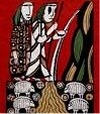
Even in the face of exile, we know that God's correction and judgment is not the last word for those who turn to Him in trust (Lam. 3:22-23). In the end, the Jewish people will be saved (Rom. 11:26), just as Moses was indeed later admitted to the Promised Land where he met with Yeshua on the Mount of Transfiguration (Matt. 17:1-5). The LORD is faithful and true, and He will never break His promise to the children of Israel...
חַסְדֵי יְהוָה כִּי לא־תָמְנוּ כִּי לא־כָלוּ רַחֲמָיו׃
חֲדָשִׁים לַבְּקָרִים רַבָּה אֱמוּנָתֶךָ׃
chas·dei Adonai ki lo-ta·me·nu, ki lo-kha·lu ra·cha·mav,
cha·da·shim la·be·ka·rim rab·bah e·mu·na·te·kha

"The faithful love (חֶסֶד) of the LORD never ceases;
his mercies (רַחֲמִים) never come to an end;
they are new every morning (חֲדָשִׁים לַבְּקָרִים);
great is your faithfulness (אֱמוּנָה)"
(Lam. 3:22-23)
Personal Update: I am fighting a cold over here - and feeling a bit wiped out from the fast. Your prayers are appreciated as I try to find some energy to add some additional Torah commentary to the site this week. Thank you, chaverim....
Shabbat Nachamu - שַׁבַּת נַחֲמוּ
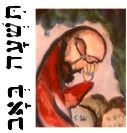
[ We have seven weeks to prepare for the start of the new year (Rosh Hashanah) and the High Holidays - a prophetic season that concerns the return of Yeshua... ]
08.10.11 (Av 10, 5771) The prophet Zechariah foresaw the future Messianic Era when the various fast days of the Jewish year will be transformed into to appointed times of great joy (Zech. 8:19): "Thus says Adonai Tzeva'ot (יהוה צְבָאוֹת): The fast of the fourth month (Tammuz), and the fast of the fifth month (Tishah B'Av), and the fast of the seventh month (Yom Kippur), and the fast of the tenth month (Asarah b'Tevet), will be to the house of Judah for joy and rejoicing, and for pleasant appointed seasons, and the truth and the peace they have loved (וְהָאֱמֶת וְהַשָּׁלוֹם אֱהָבוּ)."
Because of this prophecy of coming consolation for Israel, immediately following the fast of Av we recall the promise of coming comfort from the LORD. Therefore the sages named this Sabbath the "Sabbath of Comfort" (i.e., shabbat Nachamu: שַׁבַּת נַחֲמוּ) and assigned as Haftarah the reading of Isaiah that begins: נַחֲמוּ נַחֲמוּ עַמִּי - Nachamu, Nachamu ami - "be comforted, be comforted, my people..." (Isa. 40:1).
נַחֲמוּ נַחֲמוּ עַמִּי יאמַר אֱלהֵיכֶם
na·cha·mu na·cha·mu am·mi, yo·mar E·lo·hey·khem

"Comfort, comfort my people,
says your God" (Isa. 40:1)
The sages reasoned that the word nachamu was repeated to offer consolation for both of the Temples that were destroyed. Thematically, this Shabbat marks a time of joy over our anticipated comfort: Despite our present tribulations, in the end the LORD will vindicate His glory and completely ransom His people. Note further that the verb yomar is imperfect, implying that God is always saying this to His people...
Shabbat Nachamu marks the start of a series of seven weekly readings from the prophets called "The Seven Haftarot of Consolation" (i.e., "Shiva D'nechemta"). From the Sabbath following Tishah B'Av until Rosh Hashanah, we read words of comfort from the prophets. These selections foretell the the restoration of the Jewish people to their land (the ingathering of the exiles), the future redemption of Israel, and the coming of the Messianic Era. May Yeshua return soon, chaverim!
Note: Parashat Vaetchanan is always read on the Sabbath following Tishah B'Av.
God's Lament for His People...

08.08.11 (Av 8, 5771) The tears of the prophet Jeremiah represent God's compassionate love for the Jewish people; the Book of Lamentations is really God's cry... God cares about the suffering of His people: b'khol tzaratam lo tzar (בְּכָל־צָרָתָם לוֹ צָר) - "In all their affliction he was afflicted" (Isa. 63:9). Even after all the horrors that befell the people of Judah due to God's disciplinary judgment, the LORD still encouraged them to seek Him again. "The faithful love of the LORD (חַסְדֵי יהוה) never ceases, and his compassions never fail. They are new every morning; great is your faithfulness" (Lam. 3:22-23). Our response to the faithful love of the LORD is teshuvah (i.e., תְּשׁוּבָה, "turning [shuv] to God"). In Modern Hebrew teshuvah means an "answer" to a shelah (שְׁאֵלָה), or a question. God's love for us is the question, and our teshuvah – our turning of the heart toward Him – is the answer. We return to the LORD when we truly acknowledge that He is our Father and our King.
Tishah B'Av begins tonight at sundown: Hashivenu (הֲשִׁיבֵנוּ): "Turn us back to yourself, O LORD, so that we may return to you."
הֲשִׁיבֵנוּ יְהוָה אֵלֶיךָ וְנָשׁוּבָה
חַדֵּשׁ יָמֵינוּ כְּקֶדֶם
ha·shi·ve·nu Adonai e·ley·kha ve·na·shu·vah,
cha·desh ya·me·nu ke·ke·dem

"Turn us back to yourself, O LORD, so that we may return to you;
renew our days as of old" (Lam. 5:21)
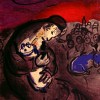
Hebrew Study Card
Let us join the lament of the Jewish people at this time. Understand Tishah B'Av as a cry for the return of Yeshua and for the salvation of Israel.. Presently He hides His face as a "diguised Egyptian" to his brothers, but one day He will be revealed as the true King of the Jews (מֶלֶךְ הַיְּהוּדִים). "Salvation is from the Jews" (הַיְשׁוּעָה מִן־הַיְּהוּדִים), and among other things that means that God has unfinished business with ethnic Israel and with Jerusalem. As Yeshua lamented, "O Jerusalem, Jerusalem, the city that kills the prophets and stones those who are sent to it! How often would I have gathered your children together as a hen gathers her brood under her wings, and you would not! See, your house is left to you desolate. For I tell you, you will not see me again, until you say, Barukh Habah b'shem Adonai (בָּרוּךְ הַבָּא בְּשֵׁם יהוה): 'Blessed is he who comes in the name of the Lord.'" (Matt. 23:37-39.
אָנָּא יְהוָה הוֹשִׁיעָה נָּא אָנָּא יהוה הַצְלִיחָה נָּא׃
בָּרוּךְ הַבָּא בְּשֵׁם יהוה
an·na Adonai ho·shi·ah na, an·na Adonai hatz·li·cha na
bar·rukh ha·ba be·shem Adonai

"Save us, we pray, O LORD! O LORD, we pray, give us success!
Blessed is he who comes in the name of the LORD!" (Psalm 118:25-26)
Part of the meaning of Tishah B'Av centers on the groaning we feel for the future... We live in a state of "already-not-yet" expectation, and therefore we are still in a sort of exile. Tishah B'Av gives us a "station" along the way that allows us to grieve for our lives and to express the ache of our spiritual affliction.... It also marks a time when we can cry out to God to make haste to restore the hope of Zion within our hearts. Come quickly, Lord Yeshua...
נַחְפְּשָׂה דְרָכֵינוּ וְנַחְקרָה וְנָשׁוּבָה עַד־יְהוָה
nach·pe·sah de·ra·chey·nu, ve·nach·ko·rah, ve·na·shu·vah ad Adonai

"Let us search and examine our ways, and turn back to the LORD"
(Lam. 3:40)

Despite the certainty of judgment upon a world that refuses to acknowledge the truth of the LORD God of Israel, we take hope in His unfailing love as revealed in Yeshua our Messiah: "The LORD is my light and my salvation (יְהוָה אוֹרִי וְיִשְׁעִי מִמִּי אִירָא); whom shall I fear? The LORD is the stronghold of my life; of whom shall I be afraid? When evil men attack me to devour my flesh, when my adversaries and enemies attack me, they stumble and fall. Even when an army is deployed against me, I do not fear. Even when war is imminent, I remain confident" (Psalm 27:1-3). Tzom kal, chaverim...
Tishah B'Av: August 8th-9th

[ The tragic holiday of Tishah B'av begins Monday, August 8th at sundown.... ]
08.07.11 (Av 7, 5771) Tishah B'Av (תִּשְׁעָה בְּאָב, the "ninth [day] of [the month of] Av") is an annual day of mourning that recalls the many tragedies that have befallen the Jewish people over the centuries, but most especially the destruction of the Holy Temple and the ongoing galut (exile) of Israel. This year Tishah B'Av begins Monday Augiust 8th at sundown and runs 25 hours until Tuesday, August 9th, one hour after sundown. The customs for observing the fast are similar to those of Yom Kippur.
Tishah B'Av is generally regarded as the saddest day of the Jewish year (even sadder than Yom Kippur) since it was on this date that the Temples were destroyed and the Jewish people were forced into exile. The root of these tragedies is said to go back to the Exodus from Egypt, when the LORD decreed a 40 year exile from the Promised Land because of the Sin of the Spies on the ninth of Av. In addition, Aaron died on Av 1 (Num. 33:38), and this was said to foreshadow the destruction of the Temple. The sages call this prophetic principle: ma'aseh avot siman labanim (מַעֲשֵׂה אֲבוֹת סִימָן לַבָּנִים): "The deeds of the fathers are signs for the children."
The ninth of Av is the lowest point of a three week period of mourning that began with the fast of the 17th of Tammuz (undertaken to recall the first breach in the walls of Jerusalem by the Babylonians before the First Temple was destroyed). The "Three Weeks of Sorrow" is intended to instill a sense of teshuvah (repentance) and to prepare for the Messianic redemption to come.
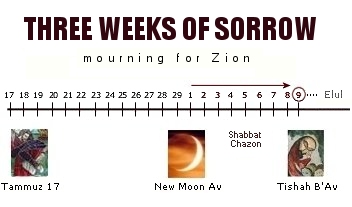 |
Torah Readings for Tishah B'Av
Tishah B'Av allows us to express heartfelt grief over the loss of Zion and therefore over the fraility of our human condition. During this time it is appropriate to grieve over our sins and to shed tears that attest to lev nishbar v'nikdeh, a "broken and crushed heart" (Psalm 51:17). Indeed, during the entire "Three Weeks of Sorrow" we read selections from the prophets that forewarn of the coming destruction of the Temple (churban) and the subsequent exile of the Jewish people (galut). During this time of the year, we listen to the lamentations of the prophet Jeremiah crying out for our repentance...
During Tishah B'Av synagogue services, the lights are dimmed and the Aron Hakodesh (Holy Ark) is draped in black (in some synagogues the parochet (curtain) is removed as a sign of mourning). The crowns with tinkling bells are removed from Torah scrolls. Congregants remove their leather shoes and do not greet each other. The cantor leads the prayers readings in a low, mournful voice. The cantillation for the Scripture readings are set to elegiac, sorrowful melodies.
In the morning service, the Torah portion of Deuteronomy 4:25-40 is read (Moses' prophecy regarding Israel's future iniquity and exile) followed by the Haftarah of Jeremiah 8:13-9:24 which describes the desolation of Zion.
Blessing before Reading Lamentations:
בָּרוּךְ אַתָּה יהוה אֱלהֵנוּ מֶלֶךְ הָעוֹלָם
אֲשֶׁר עָשָׂנוּ אֲסִירֵי תִּקְוָה
ba·rukh at·tah Adonai E·lo·hei·nu me·lekh ha·o·lam,
a·sher a·sa·nu a·si·rei tik·vah

"Blessed art You, LORD our God, King of the universe,
who has made us captives of hope."

The Haftarah for Tishah B'Av
As mentioned above, the Haftarah (prophetic reading) for Tishah B'Av comes from the prophet/priest Jeremiah (יִרְמְיָהוּ), who was an eyewitness to the destruction of the First Temple and the subsequent exile of the Jewish people. Here is a little bit of background.
The Northern Kingdom had already been judged and sent into exile (c. 722 BC) and the Kingdom of Judah was following the same self-destructive path. Sometime after King Josiah established Torah reform in the land (c. 626 BC), the LORD commissioned the Jeremiah to confront the people of Judah for their ongoing apostasy and idolatry. He was just a child at the time (Jer. 1:6-9). Jeremiah's long ministry (over 40 years) would subsequently span the reigns of five different kings of Judah: Josiah (640–609), Jehoahaz (609), Jehoiakim (609-598), Jehoiachin (598-597), and Zedekiah (597-586). During these years Jeremiah was routinely ignored, slandered as a false prophet, and abused. He was physically attacked, thrown into a well, put into stocks, imprisoned by king Zedekiah, threatened with death, and finally abducted into exile to Egypt by Jewish zealots who ignored his warnings not to rebel against the Babylonians (see the Fast of Gedaliah).
In the Haftarah for Tishah B'Av, we read how Jeremiah inwardly struggled while trying to reach the Jewish people. The LORD likened the Jews living in Judah to a withered fig tree that born no figs. "What I gave them has passed away from them" (Jer. 8:13; cp. Matt. 21:19). The people were in despair and complained that God has given them the "water of gall" (מֵי־ראשׁ) to drink because of their sins (Jer. 8:14). This water may be an image of crying (i.e., mei rosh literally means "tears from the head") or it may allude to the water given the sotah (i.e., the suspected adulteress) as explained in Numbers 5:12-31. If such a woman was indeed guilty of adultery, she would die a painful death: her body would swell, her face would become ashen, and her limbs would weaken. "We looked for peace, but no good came; for a time of healing, but behold, terror" (Jer. 8:15). God then stated that He would send the Babylonians from the north to devour the land and send serpents to bite the people (Jer. 8:16-17).
Jeremiah expressed grief over the destruction of his people and his heart was sick within him (Jer. 8:18). In his visions he heard the cry of the people asking for God's help from Zion, and he wondered how God would answer, but the LORD was angry because of Judah's ongoing idolatry and vanities (Jer. 8:19). Some time passed, but there was still no response from heaven: avar katzir kalah kayitz, v'anachnu lo noshanu (עָבַר קָצִיר כָּלָה קָיִץ וַאֲנַחְנוּ לוֹא נוֹשָׁעְנוּ): "The harvest is past, the summer is ended, but still we are not saved" (Jer. 8:20). Jeremiah wondered why there was no "balm in Giliead," no medicine to be found, that might heal the people (Jer. 8:22). Was all hope gone? As Isaiah earlier lamented, "the whole head is sick, and the whole heart faint" (Isa. 1:1-9).
Jeremiah wished he had a "head full of water" so that he could weep day and night over the death of his people (Jer. 9:1). He also wished to run away and hide in the desert (Jer. 9:2). The people were full of adultery and treachery. "Falsehood and not truth has grown strong in the land; for they proceed from evil to evil and they do not know me, declares the LORD" (Jer. 9:3). "Everyone deceives his neighbor and no one speaks the truth... they refuse to know me, declares the LORD" (Jer. 9:5-6). Because the people spoke deceitfully and schemed against their neighbors, the LORD chose to punish them. Jerusalem was decreed to become a heap of ruins. The Temple will be razed and all the cities of Judah would become desolate (Jer. 9:11).
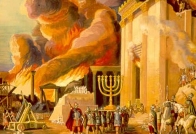
Jeremiah tried to save the people from punishment. He argued that none of the people were wise enough to understand God's teachings and therefore none of them would learn from God's punishment, either (Jer. 9:12). God rejected his intercession on their behalf, however, since the people willingly forsook the Torah and chose to disregard its commandments (Jer. 9:13). They had stubbornly hardened their hearts to follow after their own lusts. Therefore God would feed them with "wormwood" and give them "the water of gall" (מֵי־ראשׁ) to drink (Jer. 9:15). Since the people willingly broke the covenant terms given at Sinai (Jer. 11), the LORD would scatter them among the nations, just as He promised He would to Moses (Jer. 9:16; cp. Lev. 26:33; Deut. 4:27; 28:64).
After being rejected time and again, the LORD instructed Jeremiah to call for the "professional wailers" to raise a lament for Zion. "How we are ruined! We are utterly shamed, because we left the land, because they have cast down our dwellings" (Jer. 9:17-19). God then explained to them that the hour of judgment has come (Jer. 9:20-22).
The Haftarah ends with a reminder that God's Torah called for faithful love, justice, and righteousness (חֶסֶד מִשְׁפָּט וּצְדָקָה), but Israel rejected God's way of life. "Thus says the LORD: 'Let not the wise man boast in his wisdom, let not the mighty man boast in his might, let not the rich man boast in his riches but let him who boasts boast in this, that he understands and knows me, that I am the LORD who practices loyal love, justice, and righteousness in the earth. For in these things I delight,' declares the LORD" (Jer. 9:23-24). According to Rambam and other commentators, this verse indicates that of all the various human achievements (represented by intellectuals, warriors, and merchants), the knowledge of God's love (chesed), justice (mishpat), and righteousness (tzedakah) is the best and most important.
According to midrash, Jeremiah was commanded by the LORD to return home to Anatoth because his merit was so great that God could not destroy Jerusalem as long as he was in the city (Pesikta d'Rav Kahana). Once he left, however, Jerusalem was conquered and and city was set on fire. When Jeremiah returned, he saw smoke rising from the Temple and rejoiced, thinking that the people had repented and were offering sacrifices. He wept bitterly when he realized he was mistaken...
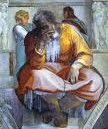
As a result of Judah's continued and unrepentant idolatry, Jerusalem was destroyed and the horrific visions of Jeremiah were fulfilled before his eyes... "The LORD has done what he planned; he has fulfilled his word, which he decreed long ago. He has overthrown you without pity, he has let the enemy gloat over you, he has exalted the horn of your foes" (Lam. 2:17). In the Book of Lamentations (i.e., Eichah: אֵיכָה), Jerusalem is personified as a woman who "weeps" for the destruction to come. She became like a widow who was left comfortless (Lam. 1:1-2). She saw babies and sucklings languish in the squares of the city (Lam. 2:10-11). All joy and hope were now lost as the people became enslaved to their captors (Lam. 5:1-4; 15-16).
Thankfully, the Book of Lamentations is not devoid of hope. Even after all the horrors that befell the people of Judah, God still encouraged them to seek Him again. "Because of the LORD's great love we are not consumed, for his compassions never fail. They are new every morning; great is your faithfulness" (Lam. 3:22-23). "The LORD is good to those waiting for him, to those who are seeking him out" (Lam. 3:25). "Let us search and examine our ways, And turn back to the LORD; Let us lift up our hearts with our hands To God in heaven: We have transgressed and rebelled, but You have not yet forgiven" (Lam. 3:40-42). The book ends with the great Hashivenu appeal to the LORD. When the reader reaches the word "Hashivenu" (the first word of the penultimate verse of the book), he pauses and the congregation recites the verse in unison: Hashivenu Adonai, elecha vena-shuvah; chadesh yamenu kekedem: "Turn us back to You, O LORD, and we shall be turned; renew our days as of old" (Lam. 5:21). Often this verse is repeated and sung to a haunting melody as the scroll is returned to the Ark.
Tishah B'Av and Yeshua's Return
When Yeshua read the Haftarah in the synagague and announced that the Messianic expectation was being fulfilled, He read only part of the passage from Isaiah 61:1-3 and then "closed the book," leaving verse "unfinished" (Luke 4:18-21). In other words, Yeshua read the following:
"The Spirit of the Lord GOD is upon me, because the LORD has anointed me to bring good news to the poor; he has sent me to bind up the brokenhearted, to proclaim liberty to the captives, and the opening of the prison to those who are bound; to proclaim the year of the LORD's favor..."
but He did not go on to finish the passage:
"...and the day of vengeance of our God; to comfort all who mourn; to grant to those who mourn in Zion - to give them a beautiful headdress instead of ashes, the oil of gladness instead of mourning, the garment of praise instead of a faint spirit; that they may be called oaks of righteousness, the planting of the LORD, that he may be glorified."
Yeshua will finish "reading" this verse when He returns at the end of the age (Yom Adonai, at the end of the Great Tribulation) to establish Zion as praise of the earth. At that time, the all the fast days surrounding the destruction of the Temple will be transformed into to appointed times of great joy (Zech. 8:19).
The word "Zion" is mentioned over 160 times in the Scriptures. That's more than the words faith, hope, love, and countless others... And since Zion is a poetic form of the word Jerusalem, the number of occurrences swells to nearly 1,000! It is therefore not an overstatement to say that God Himself is a Zionist.... "Out of Zion, the perfection of beauty, God shines forth" (Psalm 50:2). Zion represents the rule and reign of God in the earth and is therefore synonymous with the Kingdom of God. The entire redemptive plan of God -- including the coming of the Messiah Himself and our very salvation -- is wrapped up in the concept of Zion. It is the "historiography" of God -- His philosophy of history, if you will. And this perhaps explains why the world system (and its agency, the devil) routinely mischaracterizes and condemns "Zionism" as a form of racism or injustice...
God loves Zion since it symbolizes His redemptive program in human history. In a sense, Zion is the heart of the Gospel message and the focal point of God's salvation in this world. Zion represents our eschatological future -- our home in olam haba (the world to come). Even the new heavens and earth will be called Jerusalem -- "Zion in her perfection" (Rev. 21). "This is what Adonai Tzeva'ot says: I am very jealous for Jerusalem and Zion, but I am very angry with the nations that feel secure" (Zech. 1:14-15). "For Zion's sake I will not keep silent, for Jerusalem's sake I will not remain quiet, till her righteousness shines out like the dawn, her salvation like a blazing torch" (Isa 62:1). "The builder of Jerusalem is God, the outcasts of Israel he will gather in... Praise God, O Jerusalem, laud your God, O Zion" (Psalm 147:2-12).
Friends, how can we forget Zion, "the city of the living God, the heavenly Jerusalem" (Heb. 12:22)? Is she not "our mother" (Gal. 4:26)? Are we not her citizens, indeed, her exiles in this age? As the psalmist said, "If I forget you, O Jerusalem, let my right hand forget its skill! Let my tongue stick to the roof of my mouth, if I do not remember you, if I do not set Jerusalem above my highest joy!" (Psalm 137:5-6). Of course we are instructed to "pray for the peace of Jerusalem" (Psalm 126:6), but we are further told to "badger" the LORD until he makes Zion "the praise of the earth" (Isa. 62:7).
Israel still has prophetic destiny that awaits fulfillment. One day all Israel will be saved and comforted by God. Yeshua will return as Israel's Messiah and all the words given to the Hebrew prophets will literally be fulfilled. Zion will indeed become the praise of the earth!
Addendum: It is clear that we are living in a time that is not unlike that of ancient Judah before God's hammer of judgment fell. Like ancient Judah, we have little time left for us to repent before complete destruction of our nation occurs before our very eyes. Time is very short, chaverim. Though we may expect the rapture, this does not guarantee that our nation will not undergo judgment from heaven and we will face serious tribulation in the days to come... In light of the progressive judgments from heaven that continue to befall the United States, it is imperative for us to carefully heed the message and warning of Tishah B'Av. Please pray for repentance to come to this land, chaverim, before it's too late...
 |
Shabbat Chazon:
Isaiah's Vision of Destruction
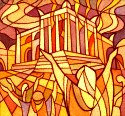
[ The following entry provides a few thoughts regarding the Haftarah reading for Shabbat Chazon (i.e., Isa. 1:1-25). The destruction of the Holy Temple - which Isaiah clearly foresaw long before it happened - is traditionally mourned on the Jewish fast day of Tishah B'av. ]
08.05.11 (Av 5, 5771) The Sabbath before the holiday of Tishah B'Av is called "Shabbat Chazon" (שַׁבַּת חַזוֹן), the "Sabbath of Vision," so named from the opening verse of the Haftarah: "Chazon Yeshayahu ven-Amotz" (חֲזוֹן יְשַׁעְיָהוּ בֶן־אָמוֹץ), the "Vision of Isaiah, the son of Amoz" (Isa. 1:1). When it was first recorded, Isaiah's vision of the destruction of the Temple was still future, and the Jews still had a chance to repent before the great tragedy befell them. However, since they did not repent, calamity finally overtook the inhabitants of Judah.... During Shabbat services, this portion is traditionally chanted using the same haunting melody as Megilat Eichah (Lamentations), the acrostic dirge of the prophet Jeremiah, who was an eyewitness to the destruction and fall of Judah and Jerusalem.
The haftarah opens with the statement, "Hear, O heavens, and listen, O earth, for the LORD has spoken" (Isa. 1:2). This opening immediately harkens back to Moses' prophetic song called the Ha'azinu, though the verbs are reversed. God's children have rebelled against Him, they have forgotten the LORD.... They have become "a sinful nation, a people laden with iniquity, offspring of evildoers, children who deal corruptly! They have forsaken the LORD, they have despised the Holy One of Israel, they are utterly estranged" (lit. they have become the "tail" or "hind side" of a brute beast) (Isa. 1:4). Since they have forgotten who they are, God has given them over to a debased identity: They were once called a "holy nation," but now they are called a "sinful nation"; they were once called a "seed blessed by the LORD," but now they are called a "sinful seed"; they were once called "children of the Living God," but now they are called "children who have become corrupt" (Metzudat David).
God rhetorically asks: "Why will you still be struck down? Why will you continue to rebel? The whole head is sick, and the whole heart faint. From the sole of the foot even to the head, there is no soundness in it, but bruises and sores and raw wounds; they are not pressed out or bound up or softened with oil" (Isa. 1:5-8). The LORD asked why the people were not reflecting upon their suffering... Samaria had already fallen and the Israelites of the Northern Kingdom had suffered exile. Parts of Judah had also been overrun, yet none of this made any difference - the people went on their daily lives acting as if nothing needed to be changed....
What's the use of chastening if you will not "get the point" of God's message? God uses affliction and pain to call you to come closer to Him - to get your attention - but if you refuse to come to Him for healing and then go on to complain, "Why are we smitten?" you will continue your rebellion, increasing it more and more. Some wounds are caused from the inner soul - your "whole head is sick" with mistaken beliefs and your whole heart aches with evil... Therefore you are sick "from the sole of the foot even to head" - some with open wounds (visible), but others with bruises (hidden pains). Despite God's "afflictions of love," Isaiah foresaw the horrible outcome of their apostasy: "Your land is desolate and burned down; devoured by foreigners, overturned before your eyes, and the daughter of Zion is left like ... a besieged city" (Isa. 1:7-8). Foreseeing further the great exile to come, Isaiah says, "If the LORD of Hosts (יְהוָה צְבָאוֹת) had not left us a "surviving remnant" (שָׂרִיד), we should have been like Sodom, and become like Gomorrah (Isa. 1:9).
The prophet then addresses faithless Judah and rebukes the nation for their vain show of religious observance: "Hear the word of the LORD, you rulers of Sodom! Give ear to the teaching of our God, you people of Gomorrah! What to me is the multitude of your sacrifices? says the LORD; I have had enough of burnt offerings of rams and the fat of well-fed beasts; I do not delight in the blood of bulls, or of lambs, or of goats. When you come to appear before me, who has required of you this trampling of my courts? Bring no more vain offerings; incense is an abomination to me. New moon and Sabbath and the calling of convocations - I cannot endure iniquity and solemn assembly" (Isa. 1:10-13). The syncretism of apostasy is detestable to the LORD, an insufferable contradiction. "How long will you go limping between two opinions? If the LORD is the true God, then worship Him, and if the Baal is, then worship him" (1 Kings 18:21). A heart that is indifferent or "lukewarm" toward the LORD invalidates and nullifies whatever merit religious rituals are thought to afford (Rev. 3:16). As the prophet later said, "Because this people draw near with their mouth and honor me with their lips, while their hearts are far from me, and their fear of me is a commandment taught by men, therefore, behold, I will again do an amazing thing for these people – an absolutely extraordinary thing. Wise men will have nothing to say, the sages will have no explanations" (Isa. 29:13-14; Matt. 15:8-9; Mark 7:6-7). Hypocrisy leads to spiritual stultification, a depraved mind that is unable to think correctly.
Regarding the abhorrence of the sacrifices, the LORD is using hyperbole, of course, since He established the sacrificial system as the means for procuring atonement for the people (the final expression of which was the glorious sacrifice of the Messiah for our sins, of course). But sacrificial offerings are of no spiritual significance unless they express a person's desire to draw near to the LORD God of Israel. Sacrifices offered without righteousness (i.e., faith: Hab. 2:4) are meaningless and offensive to God. Indeed, "serving" God by empty rituals is a farce and an abomination (תּוֹעֵבָה) to the LORD... The same can be said regarding observing "new moon" festivals and the other appointed times of the Jewish calendar (Isa. 1:14). Religious "observance" apart from the the truth of the Holy Spirit is detestable to God. It is a "burden" to His soul and something that makes Him "weary..." Likewise regarding insincere or formulaic prayer: "When you spread out your hands, I will hide my eyes from you; even though you make many prayers, I will not listen; your hands are full of blood" (Isa. 1:15). This likely refers to the practice of various "liturgical prayers" - mechanical recitations that were said in the assumption they bring merit - as well as to the Birkat Kohanim, the "priestly blessing," when the arms of the priests were outstretched to bless the people. God will ignore all such insincere petitions and feigned acts of piety. As James later wrote: "You desire and do not have, so you murder. You covet and cannot obtain, so you fight and quarrel. You do not have, because you do not ask. You ask and do not receive, because you ask wrongly, to spend it on your passions. You adulterous people! Do you not know that friendship with the world is enmity with God? Therefore whoever wishes to be a friend of the world makes himself an enemy of God" (James 4:3-5).
The LORD calls for inward heart change: "Wash! Purify yourselves! Remove your sinful deeds from my sight. Stop doing the evil! Learn to do good; seek justice, relieve the oppressed; bring justice to the fatherless, plead the widow's cause. Come now, let us reason together, says the LORD: though your sins are like scarlet, they shall be as white as snow; though they are red like crimson, they shall become like wool" (Isa. 1:16-18). Isaiah's call to wash yourself and "purify your heart" echoes James' later call: "Cleanse your hands, you sinners, and purify your hearts, you double-minded" (James 4:8). This is a cleansing of the heart's intentions, the source of what moves personal actions and renders decisions. "Learn to do good and pursue justice" (לִמְדוּ הֵיטֵב דִּרְשׁוּ מִשְׁפָּט). Learn well the message of God's heart (Isa. 1:17). Truth is "self-authenticating." Act according to the truth and you will know the truth (John 13:17). Do not deceive yourself by merely hearing the message but not living it out in your daily life (James 1:22).
לְכוּ־נָא וְנִוָּכְחָה יאמַר יְהוָה
אִם־יִהְיוּ חֲטָאֵיכֶם כַּשָּׁנִים כַּשֶּׁלֶג יַלְבִּינוּ
אִם־יַאְדִּימוּ כַתּוֹלָע כַּצֶּמֶר יִהְיוּ
le·khu-na ve'ni·va·khe·chah yo·mar Adonai,
im yi·he·yu cha·ta·ei·khem ka·sha·nim ka·she·leg yal·bi·nu
im ya·a·di·nu kha·to·la' ka·tze·mer yi·he·yu

"Come, let us reason together," says the LORD. "Though your sins have
stained you like scarlet, you can become white like snow;
even though they are red as crimson, they will be like wool."
(Isa. 1:18)

Notice that the verb translated "reason together" (יָכַח) is related to the word for "reproof," i.e., tochachah (תּוֹכֵחָה). All sound "reasoning" must begin with the foundational truth that people must turn away from their evil inclinations by returning to God in repentance (i.e., teshuvah). They must understand moral "cause and effect" and turn away from evil or else suffer the consequences of their choices (Gal. 6:7). In other words, the LORD is making an argument here and is inviting his listeners to follow his reasoning. If you turn to Me with all your heart and change your ways, then you will be cleansed from your guilt and you will find your deliverance... Note further that the little phrase, "says the LORD" (יאמַר יְהוָה) is imperfect tense - the LORD is always saying this and will continue to do so. Ultimately God is always calling for our heartfelt teshuvah, and no matter how "scarlet red" our sins might be, this word reveals that the gates of repentance are always open for those who sincerely desire to draw near to Him for healing....
The phrase, "Come let us reason together" could also be be translated as "Go and argue..." Go, rather than "come," suggests that the people should perform cheshbon hanefesh - an "accounting of the soul" - to better understand why their judgment is coming... The conclusion presents a logical dilemma: "If you are willing and obedient, you shall eat the good of the land; but if you refuse and rebel, you shall be eaten by the sword; for the mouth of the LORD has spoken" (Isa. 1:19-20). The verdict had already been reached by God, and now the people were forced to choose between two alternatives: "eat or be eaten," partake of God's goodness or be devoured by their own evil ways...
The prophet then goes on to lament the fate of Zion. "How (אֵיכָה) the faithful city has become a prostitute, she who was full of justice! Righteousness lodged in her, but now murderers. Your silver has become dross, your best wine mixed with water. Your princes are rebels and companions of thieves. Everyone loves a bribe and runs after gifts. They do not bring justice to the fatherless, and the widow's cause does not come to them. Therefore the Lord declares, the LORD of hosts, the Mighty One of Israel (אֲבִיר יִשְׂרָאֵל): "Ah, I will get relief from my enemies and avenge myself on my foes. I will turn my hand against you and will smelt away your dross as with lye and remove all your alloy" (Isa. 1:21-24). The judgment that would befall Judah would be a "refining fire" intended to purify the people and restore God's purposes for Zion: "Afterward you shall be called the city of righteousness, the faithful city" (Isa. 1:26).
צִיּוֹן בְּמִשְׁפָּט תִּפָּדֶה וְשָׁבֶיהָ בִּצְדָקָה
tzi·yon be·mish·pat tip·pa·deh, ve·sha·ve·ha bitz·da·kah

"Zion shall be redeemed by justice,
and those in her who repent, by righteousness"
(Isa. 1:27)
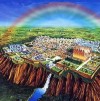
The prophet Jeremiah, an eyewitness of Isaiah's vision fulfilled, later proclaimed, "You have rejected me, declares the LORD; you keep going backward, so I have stretched out my hand against you and destroyed you - I am weary of relenting. I have winnowed them with a winnowing fork in the gates of the land; I have bereaved them; I have destroyed my people; they did not turn from their ways" (Jer. 15:6-7). These words not only apply to the historical fate of Judah, but they also resound as a warning to all nations that forsake the LORD (Psalm 2:1-5). "Rebels and sinners shall be broken together, and those who forsake the LORD shall be consumed" (Isa. 1:28). During the future time of the redemption of Israel, during the Great Tribulation, "the powerful will be like a thread of yarn, their deeds like a spark; both will burn together, and no one will put out the fire" (Isa. 1:31).
The redemption of Zion was accomplished by the cross of Yeshua, and all those who repent by trusting in Him are declared tzaddikim. Nonetheless the promise of Zion remains unfulfilled and will remain so until the end of days. One day "all Israel will be saved," though this will occur after the time of Great Tribulation that the destruction of Judah itself foretold. Time is short for us, chaverim. May God help us turn to Him with all our hearts.
 |
New Table Talk for Devarim

[ The following entry concerns this week's Torah reading, parashat Devarim. Please read the Torah portion to "find your place" here. ]
08.04.11 (Av 4, 5771) It is an age-old custom for Jews to discuss the weekly Torah portion during the Friday night Sabbath meal (before hearing it recited the following morning during services), and also during the afternoon and evening Sabbath day meals. To make it a little easier to discuss some topics, I created a new Shabbat "Table Talk" guide for parashat Devarim. The guide includes a summary of the Torah reading, a set of questions (with answers), and some additional topics for discussion. Hopefully this material will prompt some interesting discussion for your Sabbath, chaverim. You can download the PDF file from the linked page (above) or by directly clicking here.
Shabbat Chazon and Judgment....
The Sabbath that immediately precedes Tishah B'Av is called "Shabbat Chazon" (the "Sabbath of vision"), a time set apart to recall the warning of judgment and to examine the state of our hearts before the LORD. The message of Shabbat Chazan is especially appropriate for us at this dark hour of history, as God's judgment continues to fall upon the nations of this world. This year Tishah B'Av begins Monday, August 8 at sundown....
It took 11 days to travel from Sinai to Kadesh Barnea. The LORD intended Israel to begin taking possession of the land from the south, not from the east... After the people requested an ill-fated spying mission that paralyzed them in fear, Moses assured them that LORD would fight for them, just as He did in Egypt, and he further reminded them how the LORD had carried the people, "as a man carries his son" (כַּאֲשֶׁר יִשָׂא־אִישׁ אֶת־בְּנוֹ) through the desert to reach this very place (Deut. 1:29-31). Consider these words: "... the LORD your God carried you, as a man carries his son, all the way that you went until you came to this place." Moses continued, "Yet in spite of this word you did not believe the LORD your God, who went before you in the way to seek you out a place to pitch your tents, in fire by night and in the cloud by day, to show you by what way you should go" (Deut. 1:32-33). Because the people became "small in their eyes," they rebelled and refused to enter the land. This terrible sin cost them dearly, with God's decree that Israel would be exiled in Kadesh for the next 38 years -- until the exodus generation had all died out...
The sages teach that it was the 9th of Av when the Jews cried out to return to Egypt after hearing the evil report of the spies. Jewish tradition therefore regards Tishah B'Av as a "day of crying" throughout all the generations, that is, until the Messiah returns... May all Israel cry out for Yeshua soon, and in our day may they say: Hashivenu (הֲשִׁיבֵנוּ): "Turn us back to yourself, O LORD, so that we may return to you" (Lam. 5:21).
הֲשִׁיבֵנוּ יְהוָה אֵלֶיךָ וְנָשׁוּבָה
חַדֵּשׁ יָמֵינוּ כְּקֶדֶם
ha·shi·ve·nu Adonai e·ley·kha ve·na·shu·vah,
cha·desh ya·me·nu ke·ke·dem

"Turn us back to yourself, O LORD, so that we may return to you;
renew our days as of old" (Lam. 5:21)

Hebrew Study Card
A foretaste of comfort... The LORD God of Israel is faithful - even if we are not (2 Tim. 2:13). The prophet Jeremiah who foresaw and lived through the destruction of the Temple wrote: "Thus says the LORD: 'The people who survived the sword found grace in the desert; when Israel sought for rest, the LORD appeared to me from a distance saying, 'I have loved you with an everlasting love (וְאַהֲבַת עוֹלָם אֲהַבְתִּיךְ); therefore I have drawn you out in kindness' (חֶסֶד). Again I will build you, and you shall be built, O virgin Israel..." (Jer. 31:3-4)
Wishing you great peace in the midst of the storms of this world, chaverim. Shabbat Shalom and Keep yourselves in the love of God given in Yeshua (Jude 1:21).
Judging Righteous Judgment...

[ The following entry concerns this week's Torah reading, parashat Devarim. Please read the Torah portion to "find your place" here. ]
08.03.11 (Av 3, 5771) The Torah teaches that because of the Sin of the Spies, the entire generation of Israelites rescued from Egypt was sentenced to die in the desert. According to the Midrash Eichah Rabbah, every year until the fortieth year (after the Exodus), on the eve of the Ninth of Av, Moses would command the people, "Go out and dig," and the people would leave the camp, dig graves, and sleep in them overnight. The following morning a messenger would proclaim, "Let the living separate from the dead!" Fifteen thousand would die that very night, but the survivors would return to the camp for another year.
This occurred year after year, but in the fortieth year no one died. Since they thought they might have miscalculated the days, they slept in their graves an additional night. This went on for five nights until the fifteenth of Av, when they saw the full moon, realized that there calculations were correct, and rejoiced that no more of the first generation would die. They subsequently declared Tu B'Av a day of celebration. The "desert generation" had finally died off and the new generation was finally ready to enter the land!
Moses knew that he could not go with the Jews into the Promised Land because of his sin at Meribah-Kadesh (Num. 20:10-13, Deut. 3:23-28). He therefore was aware that he had little time left to exhort the next generation before he died. The book of Deuteronomy therefore records Moses' final messages to the Jewish people and has the tone of a farewell discourse. In fact, unlike the previous four books of the Torah, the speaker in Deuteronomy is Moses himself, and even the recounting of various laws and ordinances are recorded as part of the addresses he gave.

The book of Deuteronomy opens with the Israelites in the land of Moab, just east of the Jordan river, shortly before they would enter the Promised Land. It begins, "These are the words that Moses spoke to all of Israel" / אֵלֶּה הַדְּבָרִים אֲשֶׁר דִּבֶּר משֶׁה אֶל־כָּל־יִשְׂרָאֵל (Deut. 1:1). Two things are important to note at the outset. First, the book begins with the statement that these are the words of Moses rather than the continuation of the historical narrative of the Torah (which essentially ended with the Book of Numbers). Grammatically, it begins with the word eleh (אֵלֶּה, "these") rather than v'eleh (וְאֵלֶּה, "and these"), and this indicates that the book should be regarded as its own entity. In a sense, Deuteronomy functions as Moses' commentary on the Torah, giving voice to his 40 years of experience as the leader of Israel. Second, Moses' words were addressed the children of the original Exodus generation. As already mentioned, the original generation was decreed to die out in the desert because of their unbelief. And since Moses knew he likewise would soon die, he sought to inspire the new generation of Israel to go forward and take possession of the promise of Zion. Since the first generation was disqualified because of their lack of faith, Moses' summary of the Torah's message focused on the importance of trusting and obeying the LORD. Moses emphasized the importance of cheshbon ha-nefesh (חֶשְׁבּוֹן הַנֶּפֶשׁ, "soul searching") in order to help the Jews to take possession of the promises of God.
A lot of commentators tend to regard the Book of Deuteronomy as Moses' final warning to Israel in light of their repeated failures and setbacks. Some (primarily Christian) commentators even go so far as to say that the book represents an indictment against the Jewish people that warrants regarding them as a cursed people. (This is essentially the odious doctrine of "replacement theology" that denies ethnic Israel has a future and a hope in God's plan of salvation.) Even many Jewish commentators, among them Rashi, seem to focus on Moses' rebuke (i.e., tokhachah: תּוֹכָחָה) of Israel and regard the book in a negative light. Because of this, it should be stressed at the outset that Moses' correction of Israel - including his review of the unseemly history of the desert generation - was primarily intended to remind the Jews of their high calling, their new identity, and their preciousness as God's people. As will be seen, Moses wanted Israel to remember its identity as am segulah (עַם סְגֻלָּה), God's "treasured possession among all peoples" (Exod. 19:5). Moses' admonition (מוּסָר) functions more like the plea of a father to his children to walk in a manner that is worthy of his name than a stinging rebuke of the sins of his children. "My son, despise not the discipline (musar) of the Lord; neither be weary of his correction (tokhachah). For whom the Lord loves he corrects; even as a father the son in whom he delights" (Prov. 3:11; cp. Heb. 12:5-6). Therefore, "Know then in your heart that as a man disciplines his son (כַּאֲשֶׁר יְיַסֵּר אִישׁ אֶת־בְּנוֹ), the LORD your God disciplines you" (Deut. 8:5).
Note: This entry continues here.
 |
Harden not your heart...

[ I wrote the following entry last year while reflecting on this week's Torah reading, parashat Devarim. Please read the Torah portion to "find your place" here. ]
08.02.11 (Av 2, 5771) Our Torah portion this week describes how God hardened the heart of Sihon, king of Chesbon, in order to bring about his destruction (Deut. 2:30). Like the Pharaoh who stubbornly refused to heed the message of God's salvation, the LORD "hardened Sihon's spirit" (כִּי־הִקְשָׁה יהוה אֱלהֶיךָ אֶת־רוּחוֹ) so that he would not yield to the purposes and plans of God. Notice that the Hebrew word translated "hardened" (i.e., hikshah) here is the same word used to describe how Pharaoh's hardness of heart caused the death of the firstborn in Egypt (Exod. 13:15). For more on this subject, see Parashat Bo: "Hardening of the Heart."
People who do not know God are described as those who "walk in the futility (ματαιότης) of their minds" (Eph. 4:17). "They are darkened in their understanding, alienated from the life of God because of the ignorance (ἄγνοια) that is in them, due to their hardness of heart" (Eph. 4:18). This hardness of heart leads to a state of callousness or apathy (ἀπαλγέω, lit. the "inability to feel"), which is the very opposite of empathy or compassion (Eph. 4:19). Notice the progression of this process. People are darkened in their understanding and alienated from the life of God because of the ignorance that comes from having a hardened heart. Put the other way around, having a hardened heart leads to ignorance, alienation from the life of God, darkened understanding, and a "futile" mind... But notice that the heart of man is central (Prov. 4:23) because it determines the "issues of life." It is the heart (לֵבָב), or the "inner man," that determines what to acknowledge and what to ignore (i.e., ignore+ance). Indeed, salvation itself is a matter of believing the truth of the gospel message from the heart (Rom. 10:9).
A heart that is insensitive, indifferent, unfeeling, and callous toward the needs of others is regarded as "hard." Both Pharaoh and Sihon refused to empathize with the suffering of the Jewish people and thereby they became enshrouded in darkness. The darkness within them led to cruelty which further alienated them from the life of God due to their willful ignorance.
Sometimes hardness of heart comes as a result of living in a fallen world. Many people live with abiding "scar tissue" that surrounds their heart, making them feel numb and unwilling to open up and trust others. Their affections have become disordered and their ego rationalizes blaming others or seeking various forms of entitlement. "Turning off your heart" can mean suppressing any positive regard for others (empathy) while nurturing anger and self-righteousness, or it may mean withdrawing from others as a lifeless shell (both approaches vainly attempt to defend the heart from hurt). Although Yeshua always showed great compassion, especially to the wounded and broken in spirit (Isa. 42:3), He regularly condemned the "hardness of heart" ("sclero-cardia," σκληροκαρδία) of the self-righteous and religious types who were opposed his work of healing and love. Such indifference toward the suffering of others caused Yeshua to feel grief (Mark 3:5). Did not the Torah explicitly state: לא תְאַמֵּץ אֶת־לְבָבְךָ / "you shall not harden your heart" against your poor brother (Deut. 15:7)? How much more should a man not "put away" his wife? Moses was forced to "change" the original intent of the Torah regarding the question of divorce as a concession to the hardheartedness of sinful men (Matt. 19:3-9).
Perhaps the telltale sign of having a hard heart is the refusal to listen (i.e., obey) God's word. The LORD said to the prophet Ezekiel: "But the house of Israel will not be willing to listen to you, for they are not willing to listen to me: because all the house of Israel have a "strong forehead" (חִזְקֵי־מֵצַח) and a "hard heart" (קְשֵׁי־לֵב) (Ezek. 3:7, Cp. Jer. 5:23; 7:24). A hard heart has a form of "sclerosis" that makes it closed off and impermeable to love from others, and especially from God. Scripture uses various images to picture this condition, including a "heart of stone" (Ezek. 36:26, Zech. 7:12), an "uncircumcised heart" (Jer. 9:26), a "stiff neck" (Deut. 31:27), and so on. Stubbornness is really a form of idolatry, an exaltation of self-will that refuses to surrender to God.
For example, in the aftermath of the grievous Sin of the Golden Calf, the LORD threatened to wipe out the Jews because they were am k'she oref (עַם־קְשֵׁה־ערֶף), a "stiff-necked people" (Exod. 32:9). Various explanations for this term have been given, including the medieval commentator Sforno's description that a "stiff necked person" is someone who mulishly refuses to "move his head" and listen to those attempting to guide and help him. The neck, after all, is the "corridor" between the head and the heart, and having a "stiff neck" suggests an inflexible way of thinking and feeling... The rebels who enticed Aaron to create the golden calf were certainly "stiff necked" and obstinate. Despite witnessing the great miracles of the Exodus and experiencing the awesome revelation at Sinai, they obstinately insisted that Aaron make them "gods" that would return them to the "fleshpots of Egypt." Now that's some kind of chutzpah!
Later, Moses appealed to the people to "circumcise the foreskin of your heart, and be no more stiff-necked'" (Deut. 10:16). This metaphor pictures removing a hard, outer covering so that the heart is "opened up" to feel once again. God wants us to experience compassion (com+passion: "feeling-with") and sympathy for other people's suffering... Heart circumcision represents a radical turning away from the insular realm of the self toward the emotional realm of others and God. The LORD wants us to open our hearts to the needs of other people in our lives. Indeed, the "law of the Messiah" (תּוֹרַת הַמָּשִׁיחַ) is to bear one another's burdens (Gal. 6:2).

Can believers in Yeshua have hard hearts? Yes, unfortunately, they can... When the disciples saw miracles, for example, they often did not understand because "their hearts were hardened" (Mark 6:52, 8:17). They had somehow "missed" the sense of awe, surprise, and wonder over the miraculous Presence of the LORD in their midst. They did not expect the miracles because their minds were made dull and unable to comprehend reality (John 12:40, Rom. 11:7, 2 Cor. 3:14, using the same Greek word, πωρόω). Yeshua linked this hardness to blindness, both physical and spiritual (John 12:40). Even after the resurrection, Yeshua rebuked his closest followers for their unbelief and hardness of heart (σκληροκαρδία), because they did not believe the testimony of Mary Magdalene and the other witnesses of His resurrection (Mark 16:11-14). The disciples somehow "forgot" Yeshua's repeated teaching that He must suffer, die, and be raised on the third day (Matt. 16:21; Luke 9:22).
Believers are furthermore warned not to become hardened (σκληρύνω) through the deceitfulness of sin (Heb. 3:13). Tolerance for sin causes the heart to become dull and deadened. Just as one mitzvah leads to another, so one sin leads to another... Allowing sin to go unchecked in your life (i.e., by "forgetting" to confess your sins) is to be under the influence of the "deceitfulness of sin" (ἀπάτῃ τῆς ἁμαρτίας). As Bonhoeffer wrote: "Silence in the face of evil is itself evil: God will not hold us guiltless. Not to speak is to speak. Not to act is to act."
In this sense, the deceitfulness of sin is really a form of self-deception (i.e., "fooling yourself"), since (by definition) sin requires the consent of the will to do its dirty business within the heart. When it comes to moral decisions, there really are no "accidental" sins. Can you imagine a man committing adultery and claiming that it was an "accident"? The deceitfulness of sin is also called the "lusts of deceit" (Eph. 4:22), from a Greek word (ἀπατάω) that means to be "cheated out" of something. Just as a hard heart refuses to see the miraculous Presence of God, so it refuses to see the danger of sin. Whether it disbelieves the miraculous in Yeshua or "winks at" the presence of sin, such hardness of heart inevitably leads to a sort of stupor or denial of reality. Such self-deception cheats you from living the life God calls you to live...
If we refuse to confess the truth about our inner condition to God in genuine humility, our correction may be prolonged through the process of further "hardening." Often we are not conscious of this process within ourselves, and then -- when we are made conscious -- we may find ourselves helpless to change our direction. This state of helplessness provides another opportunity for the heart to cry out to God for deliverance. If, however, we yet harden our hearts further, God may "give us over to a depraved mind" (ἀδόκιμος. lit. "tested to be found useless") that is no longer able to discern or resist the presence of evil (Rom. 1:28). This is a state of having an entirely dead heart and is the worst possible judgment from heaven. In this sense, the hardened heart is simply God's ratification of the will of the sinner. The sages wrote, "God leads men along a path which they themselves choose. If a man wants to be good, God leads him toward goodness; if he wants to travel an evil road, God helps him do that, too." According to their desires God rewards the wicked in this world and the righteous in the world to come. As C.S. Lewis once said, "There are only two kinds of people in the end: those who say to God, 'Thy will be done,' and those to whom God says, in the end, 'Thy will be done.'" "The heart of a man plans his way, and the LORD establishes his steps" / לֵב אָדָם יְחַשֵּׁב דַּרְכּוֹ וַיהוה יָכִין צַעֲדו (Prov. 16:9).
If we cry out to the LORD for salvation, He has promised to hear us (Rom. 10:13, Joel 2:32). The awareness that we are hardhearted and self-deceived can lead to a (blessed) sense of brokenness and despair -- i.e., to the realization that own self-sufficiency is futile and ultimately self-destructive. Turning to the LORD in despair of ourselves is a mark of humility. When we are emptied of ourselves, we are delivered from pride and self-deception and thereby enabled to truly ask for God's help... This is a miracle, since most of us have "a little Pharaoh inside," clamoring that we be the center of our universe and refusing to submit to the Presence of the LORD...
God wants us to have "soft" hearts that are malleable and subject to His touch and influence. Consider the Biblical analogy of a potter who works with clay (Isa. 64:8, Jer. 18:6). Hard clay is brittle and hard to work with, though soft clay can be molded and adapted for a variety of uses. Applied to our heart attitudes, soft clay represents being open and moveable, whereas hard clay represents being inflexible, intolerant, and so on. A "hard hearted" person is closed-minded, assured of his own righteousness, and unwilling to admit the possibility of being wrong. He is really a "fragile" soul who is often hidebound by traditions, unwilling to be corrected, and usually so driven by fear and suspicion that he is unable to look at other possibilities. When we find ourselves becoming rigid, inflexible, and intolerant, we may be demonstrating hardness of heart.

Hardness of heart is something all of us deal with, even those who believe in Yeshua. After all, believers are commanded to "put off the old self with its practices" (Col. 3:9) and are repeatedly urged not to harden their hearts (μὴ σκληρύνητε τὰς καρδίας) through unbelief (Heb. 3:8,15, 4:7). May the God's love help us keep our hearts soft and open toward others... May He give us a new heart, and put a new spirit within us. May He remove the heart of stone (לֵב הָאֶבֶן) from us and give us a heart of flesh (לֵב בָּשָׂר). May we be lev echad (לֵב אֶחָד) - "one heart" - with one another and with the Father (Ezek. 11:19). May we be so sensitized to the Presence of God that we detect the slightest touch from His hand upon us. Amen.
Parashat Devarim - דברים

[ The following entry concerns this week's Torah reading, parashat Devarim. Please read the Torah portion to "find your place" here. ]
08.01.11 (Av 1, 5771) The Hebrew word devarim ("words") can refer either to the Book of Deuteronomy (as a whole) or to the first traditional Torah reading from that book. In both cases, however, the name comes from the Hebrew phrase אֵלֶּה הַדְּבָרִים (eleh ha-devarim, "these are the words..."), found in the opening verse (Deut. 1:1). In our English Bibles, the Book of Devarim is called Deuteronomy ("second law"), a term coined from a Greek word (δευτερονομιον) used to translate the Hebrew phrase מִשְׁנֵה הַתּוֹרָה, mishneh ha-Torah, i.e., "a copy" or "repetition" of the Torah (found in Deut. 17:18). In the Jewish Bible, the Book of Devarim is sometimes simply called the "book of the law" (סֵפֶר הַתּוֹרָה). In traditional codex form, it has 34 chapters that are divided into 11 weekly Torah readings.
Parashat Devarim (i.e., the first "portion" of the book bearing the same name) is read every year during the Three Weeks of Sorrow on the Shabbat immediately before Tishah B'Av. In Jewish tradition, this Sabbath is called Shabbat Chazon (שַׁבַּת חַזוֹן), "the Sabbath of Vision," since the Haftarah that is read comes from the vision of the prophet Isaiah regarding the coming destruction of the Temple. In Jewish tradition, teshuvah (repentance) and confession are the themes of this Shabbat.
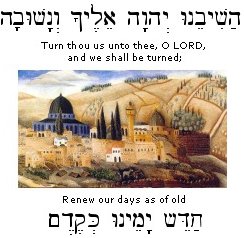
At the beginning of the Torah portion, Moses gives words of musar (rebuke or correction) regarding the Sin of the Spies. It was this sin of unbelief, you may recall, that led to the LORD's decree that the generation that left Egypt would not enter into the Promised Land. The New Testament calls this episode the "provocation" or "rebellion" (παραπικρασμος), which the "unpardonable sin" of the Torah (Heb. 3:15-4:1) - far worse even than the Sin of the Golden Calf. According to the Talmud, because of Israel's unbelief the LORD decreed that this date (the 9th of Av) would be one of perpetual mourning, foretelling the time when the people would grieve over the Temple that was destroyed in their midst.
In the midrash Pesikta Rabbati (פסיקתא רבתי) it is noted that Moses began his last book with the phrase eleh ha-devarim ("these are the words") because the Torah is compared to a bee (דְּבוֹרָה) whose honey is sweet but whose sting is poisonous (the word devarim (דְּבָרִים) looks like the word for bees (דְבוֹרִים)). The words of Torah give joy and sweetness to those who heed it (Psalm 19:10), but they are deadly poison to those who do not. It is a fearful thing to fall into the hands of the Living God (Heb. 10:31), and as Yeshua warned his followers, "from him that has not, even that he has shall be taken away from him" (Luke 19:26). (For more on this, see "These are the Bees.")
יְהוָה אֱלהֵי אַבְרָהָם יִצְחָק וְיִשְׂרָאֵל אֲבתֵינוּ
שֳׁמְרָה־זּאת לְעוֹלָם
לְיֵצֶר מַחְשְׁבוֹת לְבַב עַמֶּךָ
וְהָכֵן לְבָבָם אֵלֶיך
Adonai Elohei Avraham Yitzchak ve'Yisrael a·vo·tei·nu
sho·me·rah zot le'o·lam,
le'ye·tzer mach·she·vot le·vav a·me·kha
ve'ha-khen le'va·vam e·le·kha

"O LORD God of Abraham, Isaac, and Israel our fathers,
guard forever the inclinations of the thoughts in the hearts of your people;
direct their hearts to you"
(1 Chron. 29:18)

Some of the sages suggest that we should only offer musar (correction) to others when we are close to our own time of death, just as Moses waited to the end of his life to offer rebuke to the children of Israel. We do this in order to avoid the dreadful sin of lashon hara (evil speech). This is why the Book of Devarim begins, "These are the words that Moses spoke," suggesting a distinction between his words and the words of the LORD. If we offer rebuke to others prematurely, we run the risk of making people feel ashamed and discouraged, rather than encouraging them to perform teshuvah and return to the LORD. Constructive criticism given at the end of one's life, however, does not induce shame and will retain itself in the loving memory of the one rebuked.
Note: Please keep me in your prayers, chaverim. I have been struggling lately. Thank you.
|








































